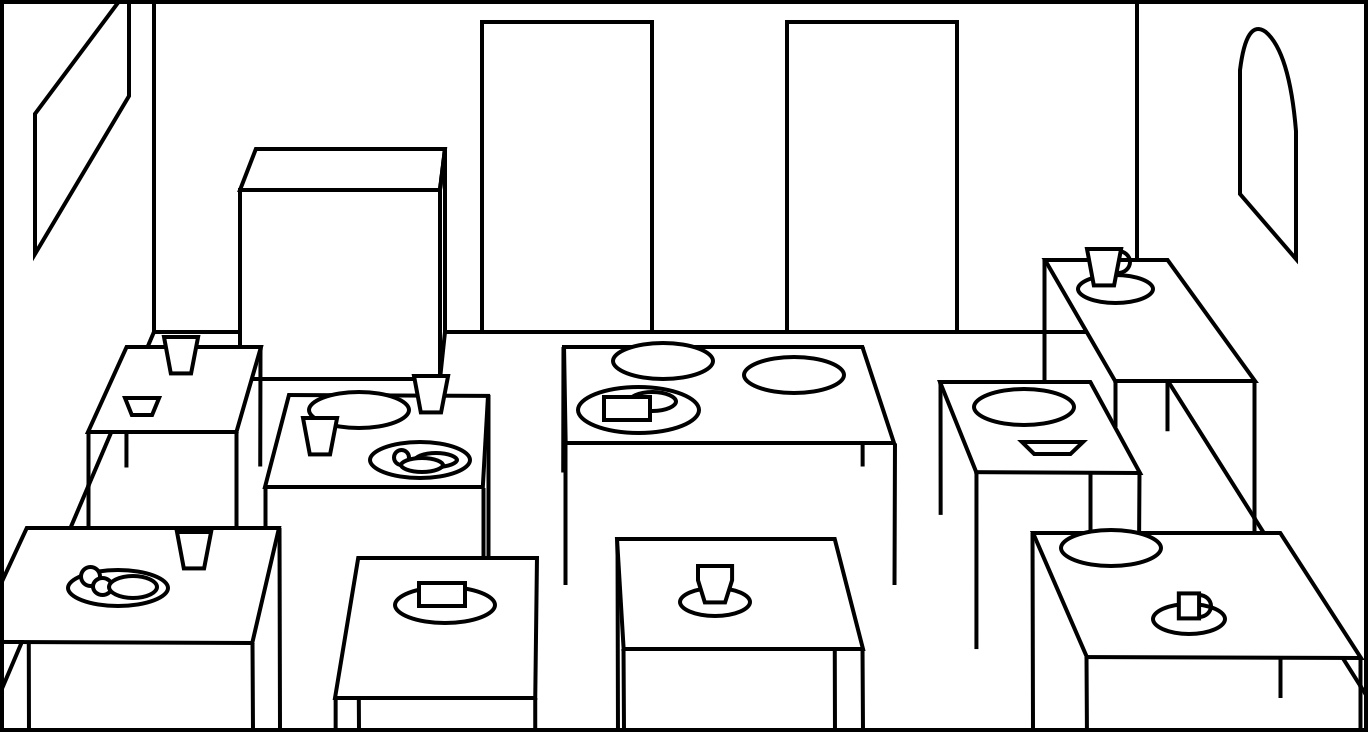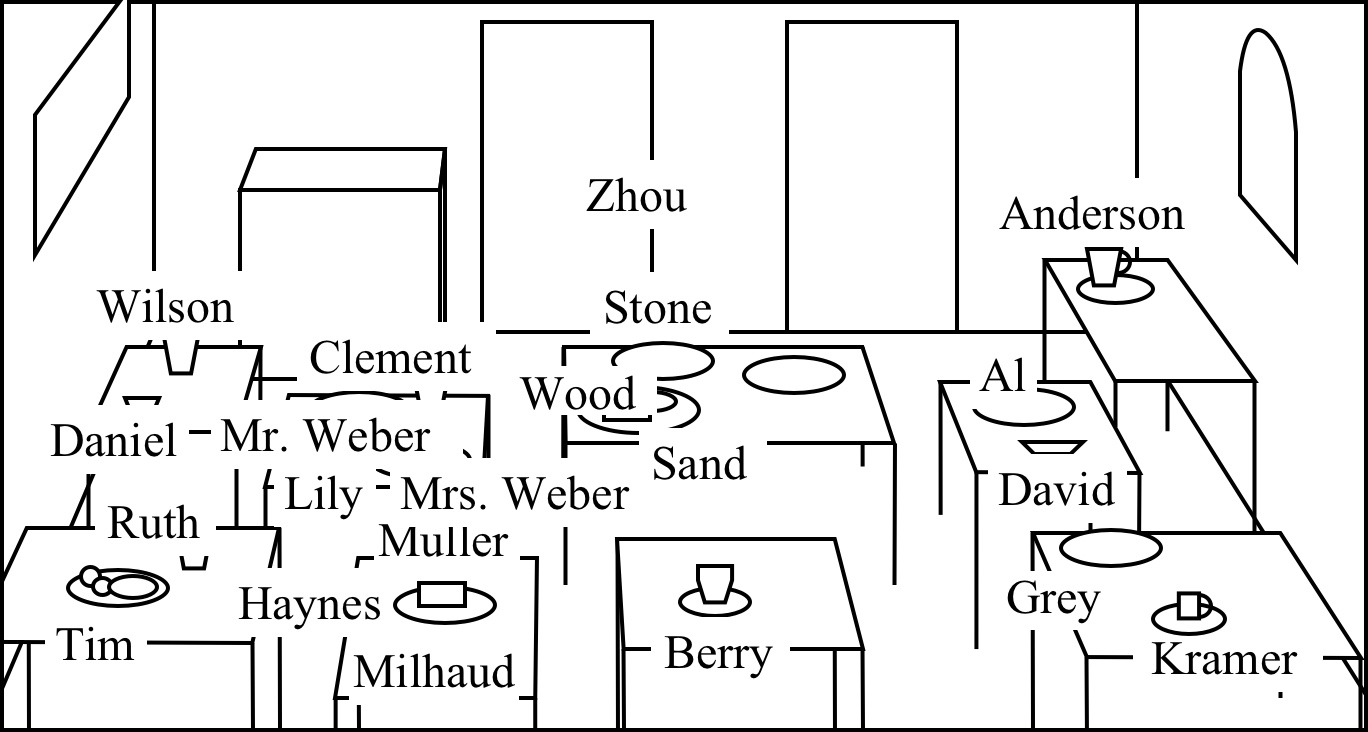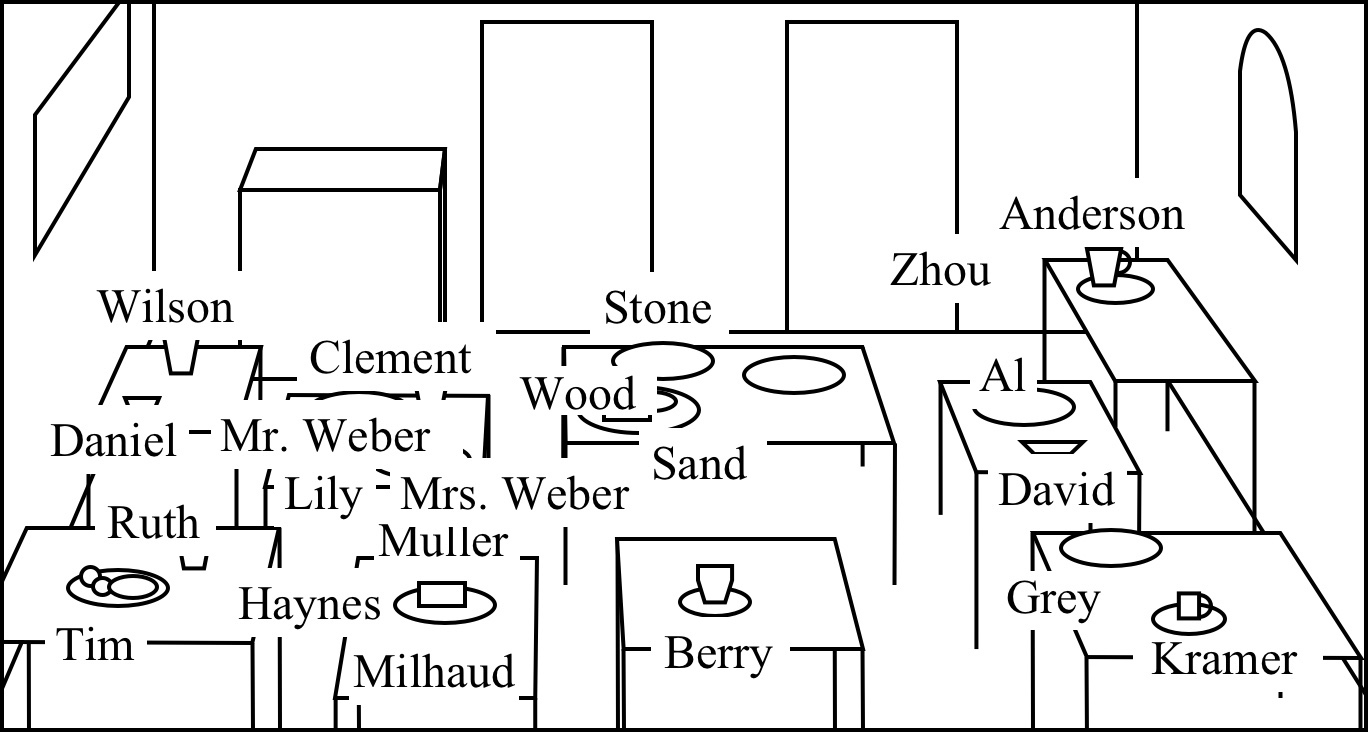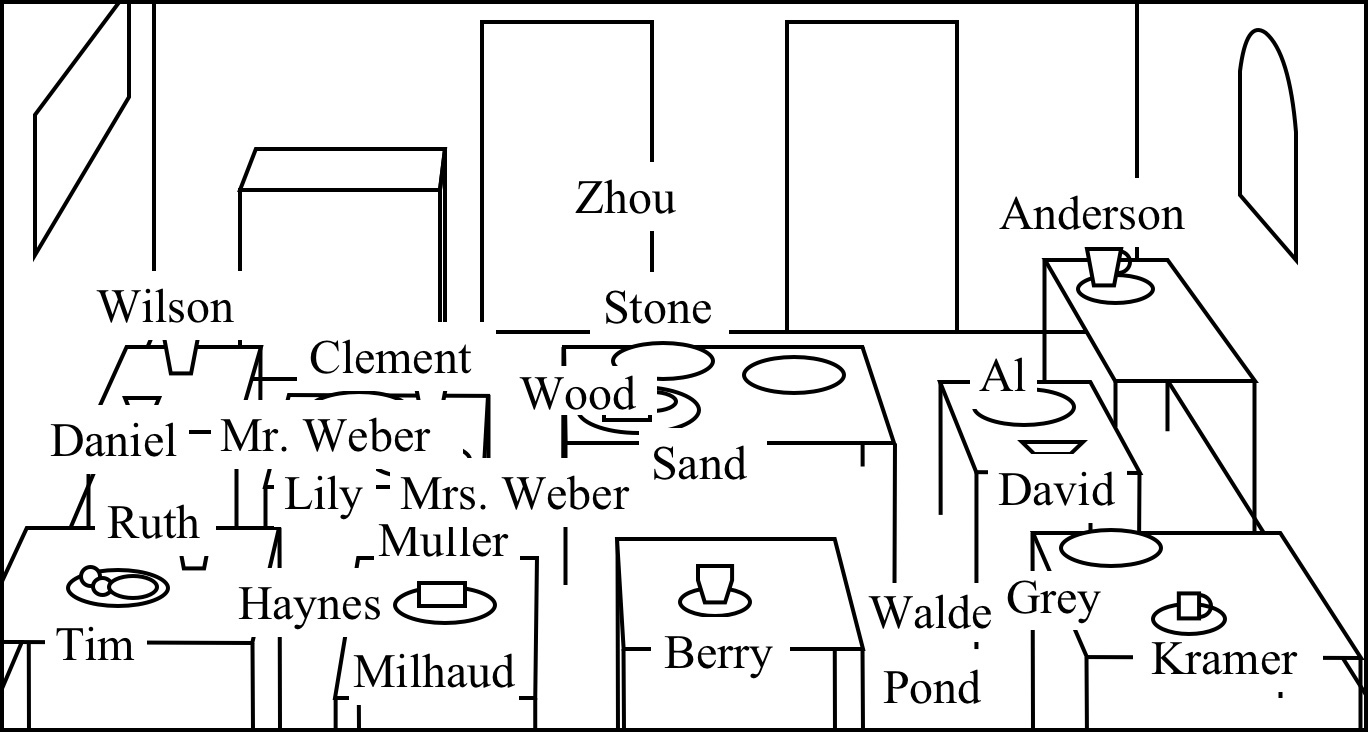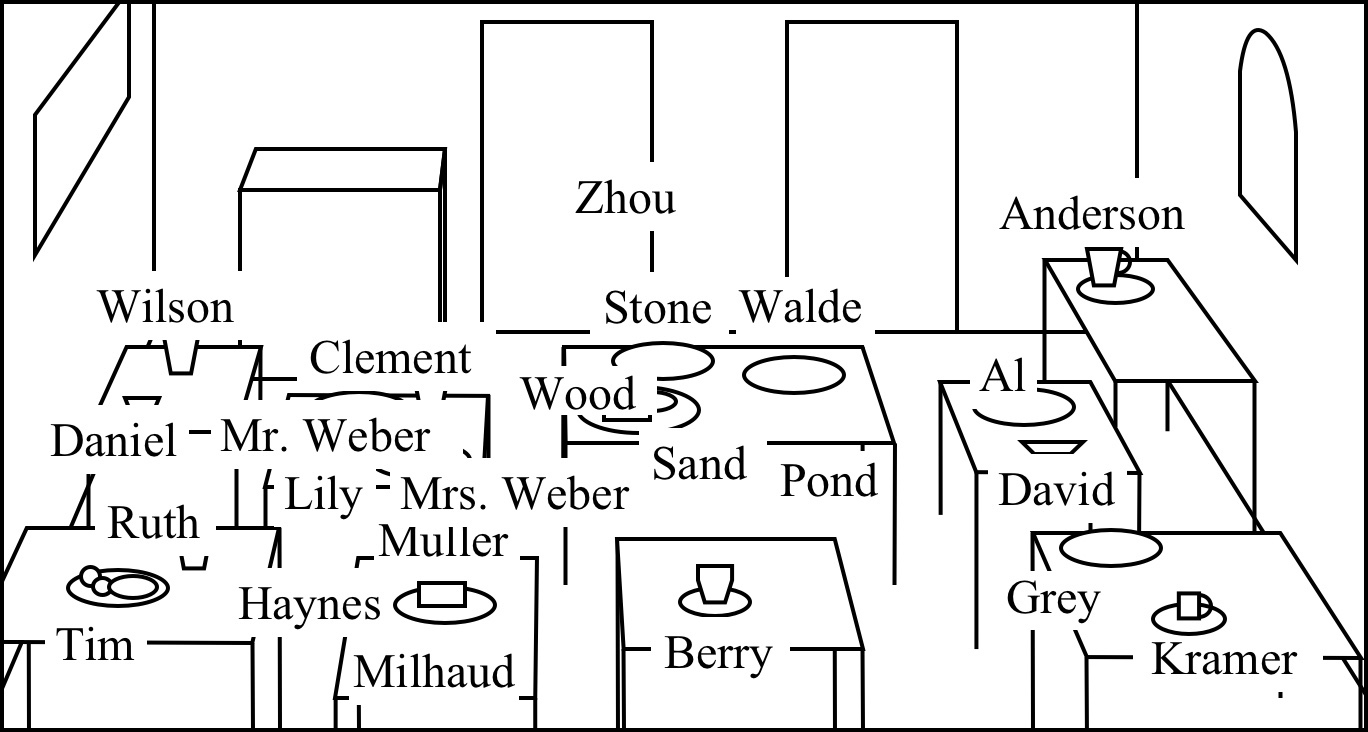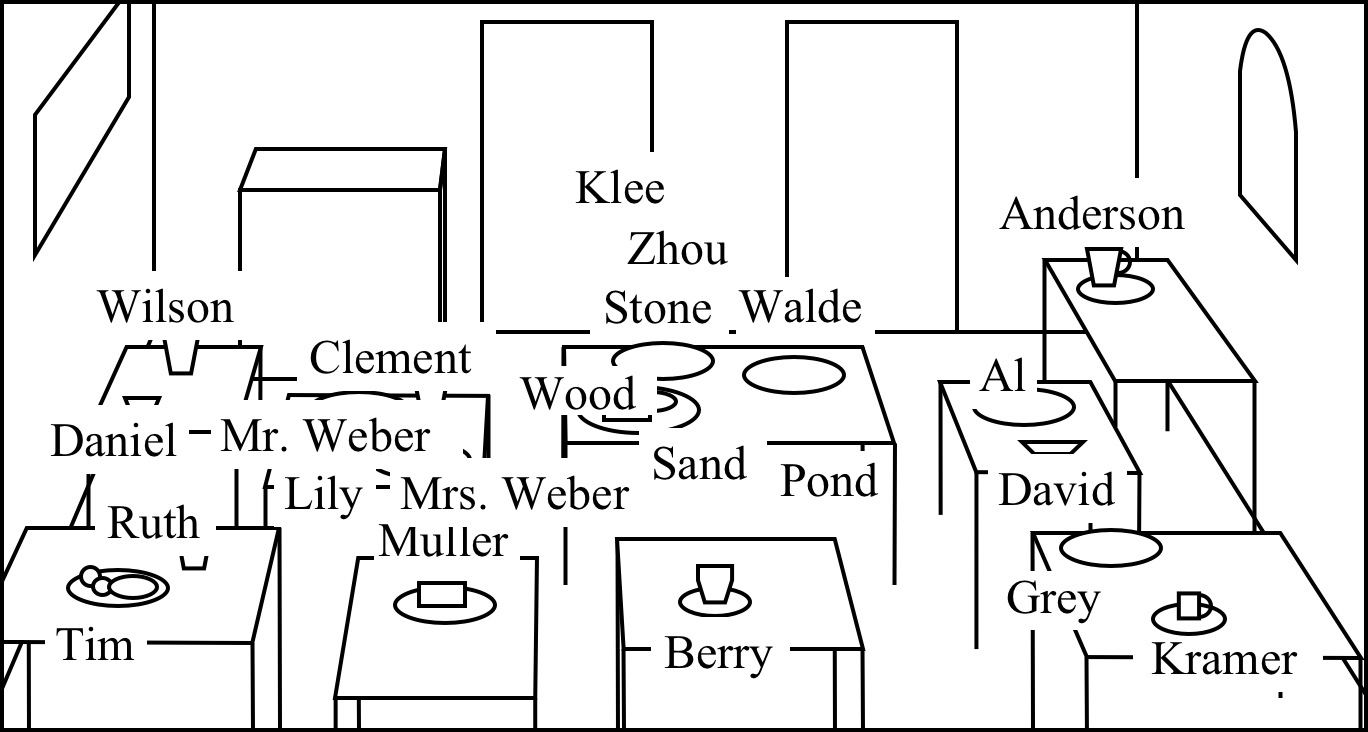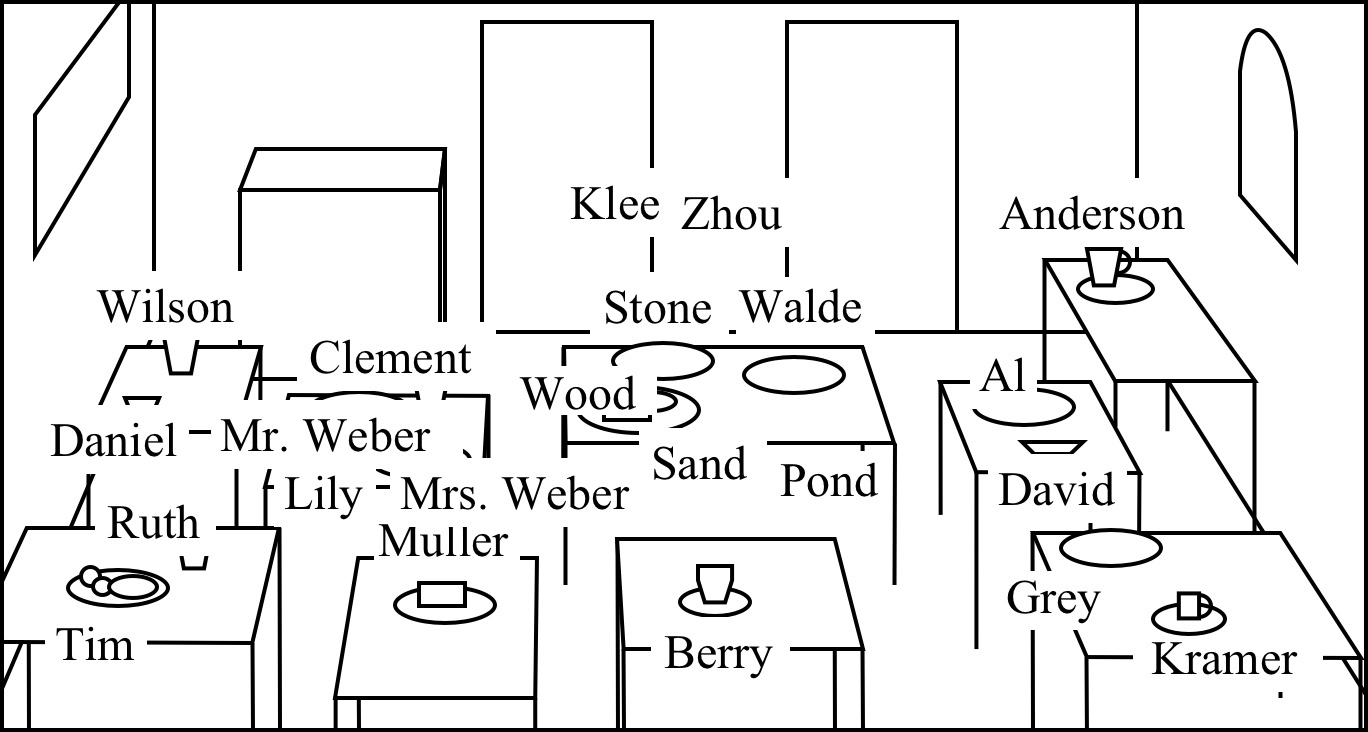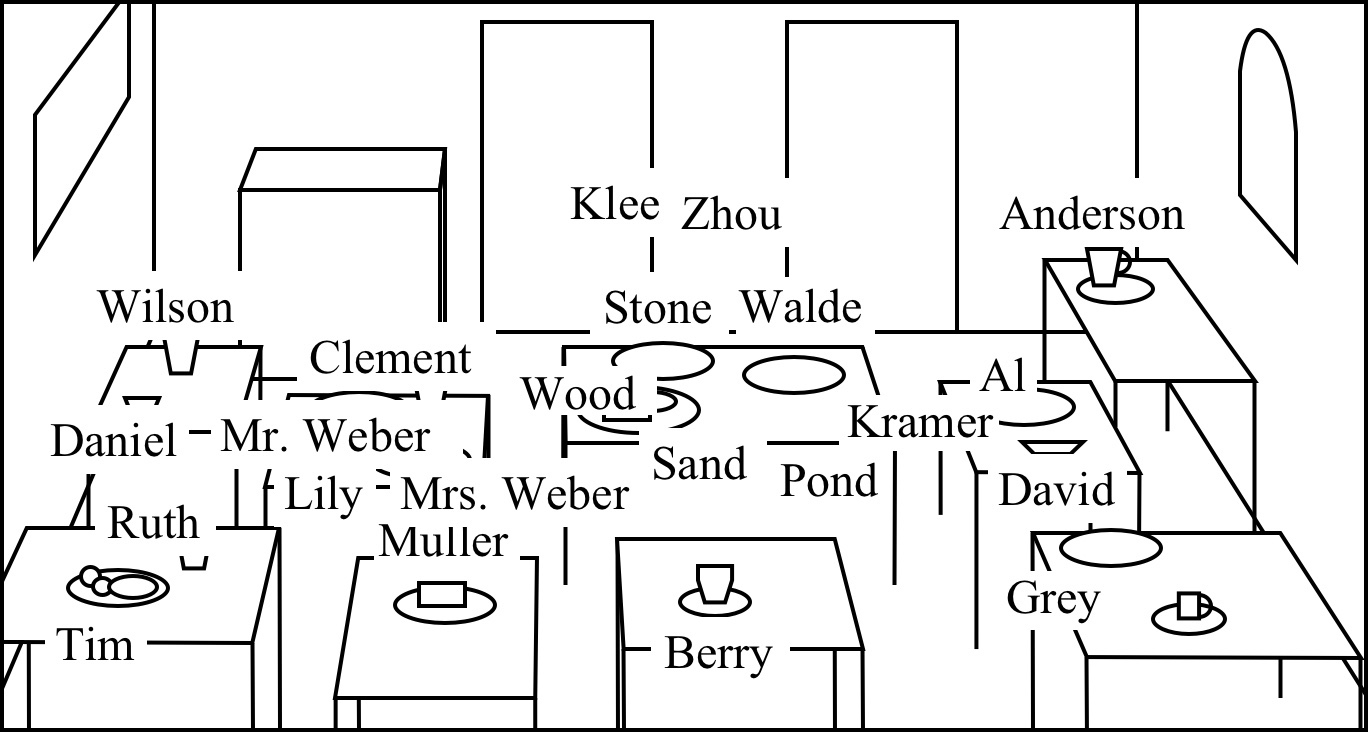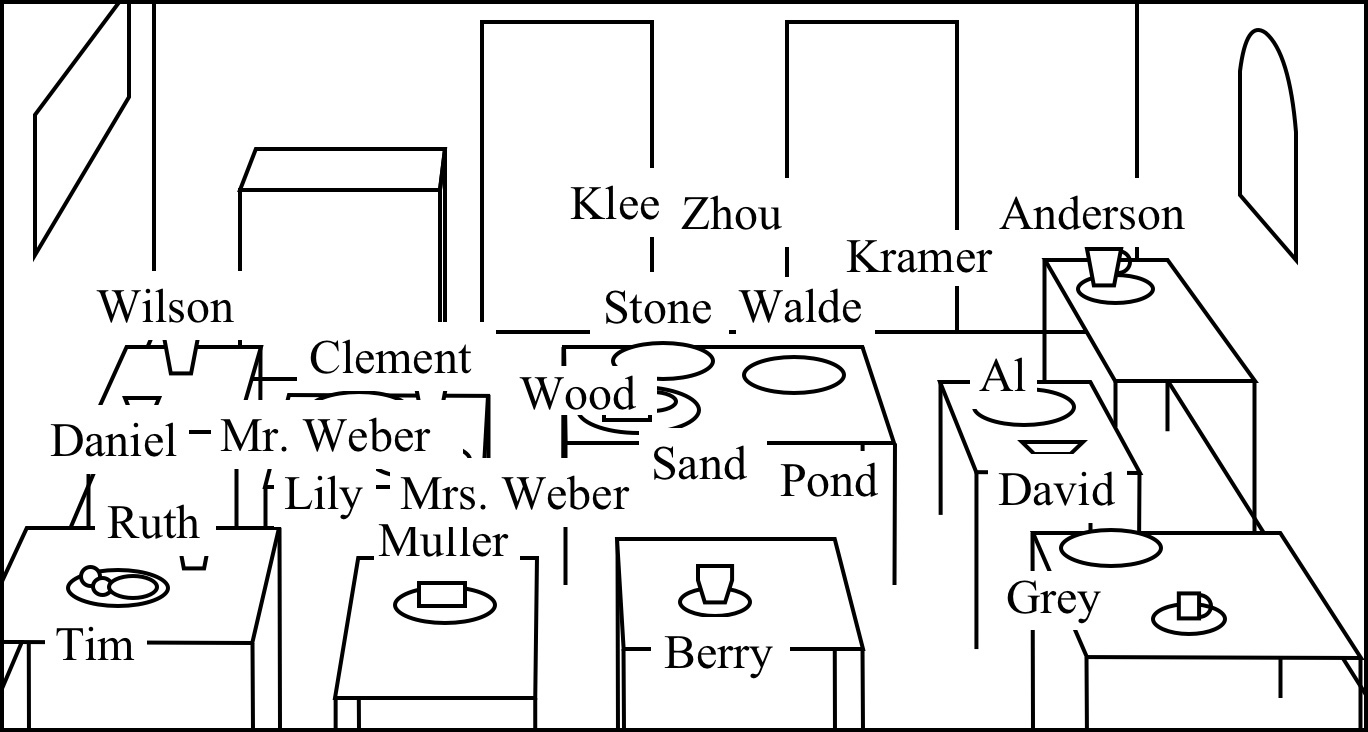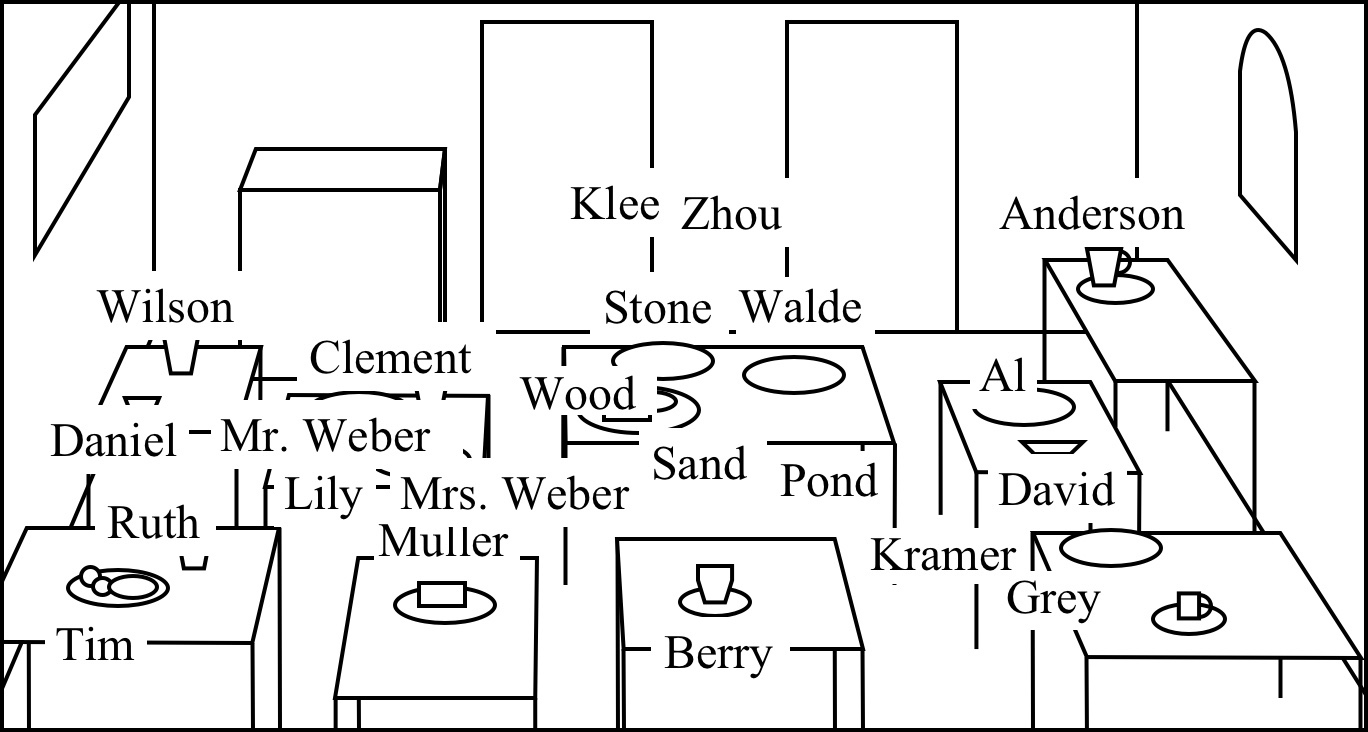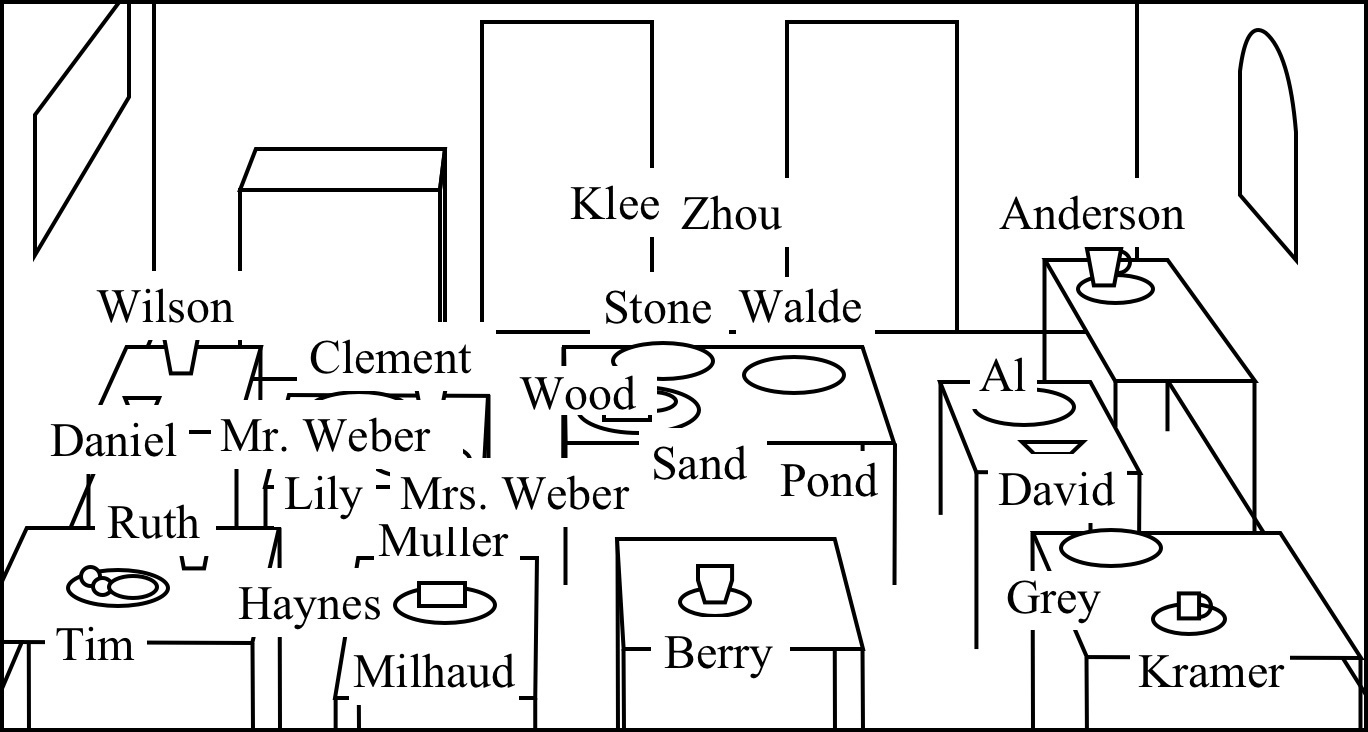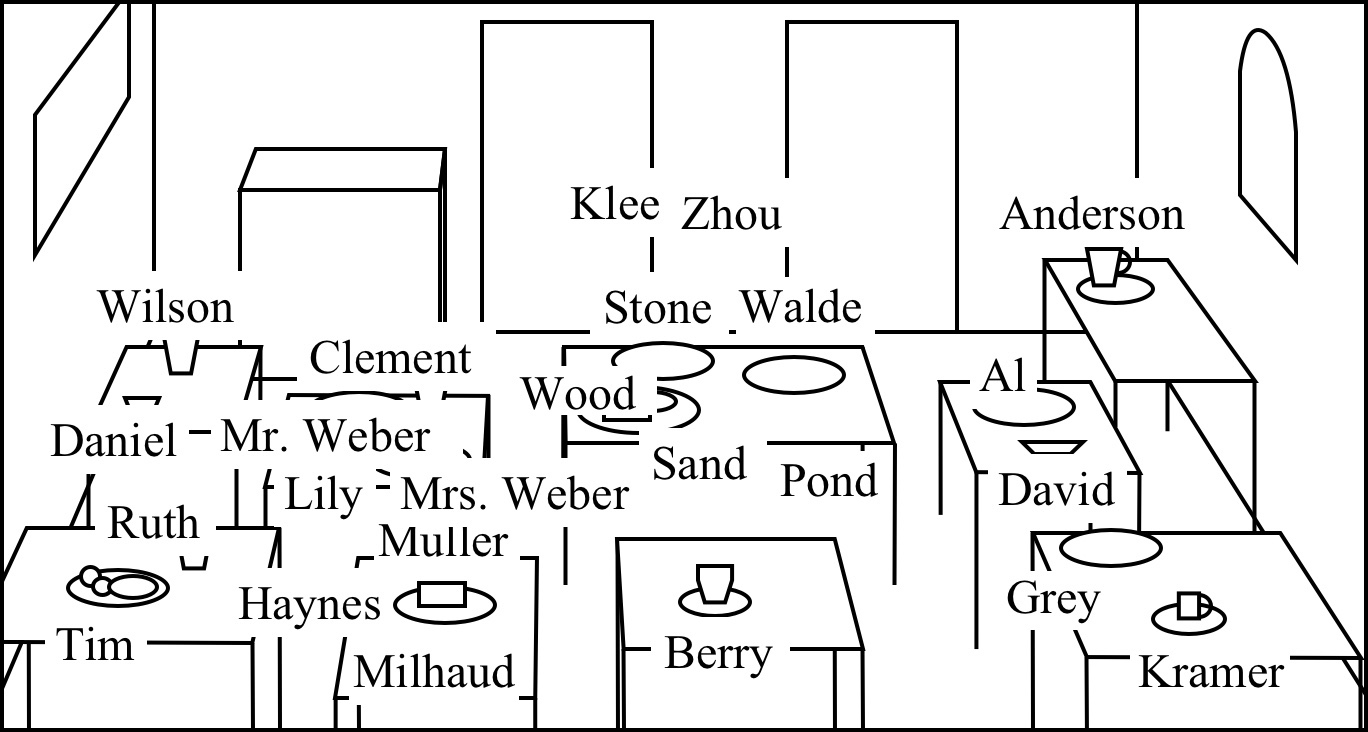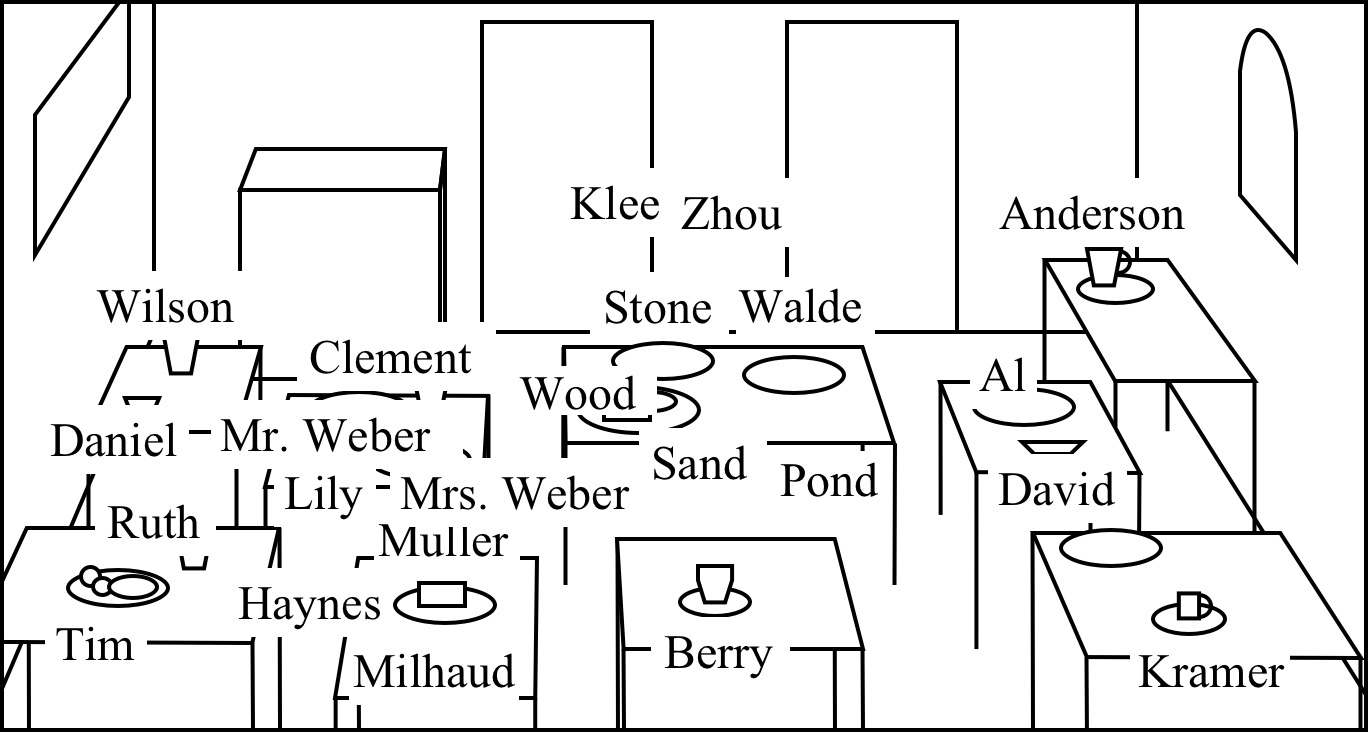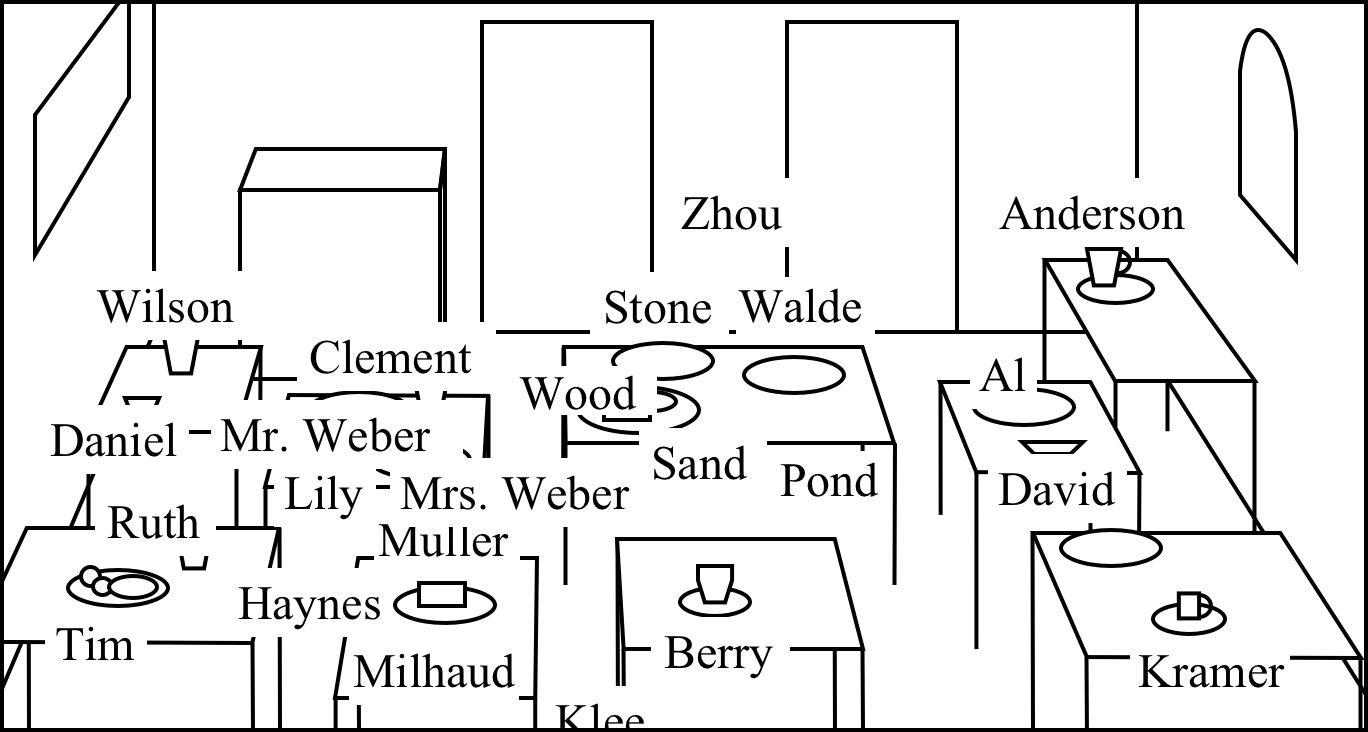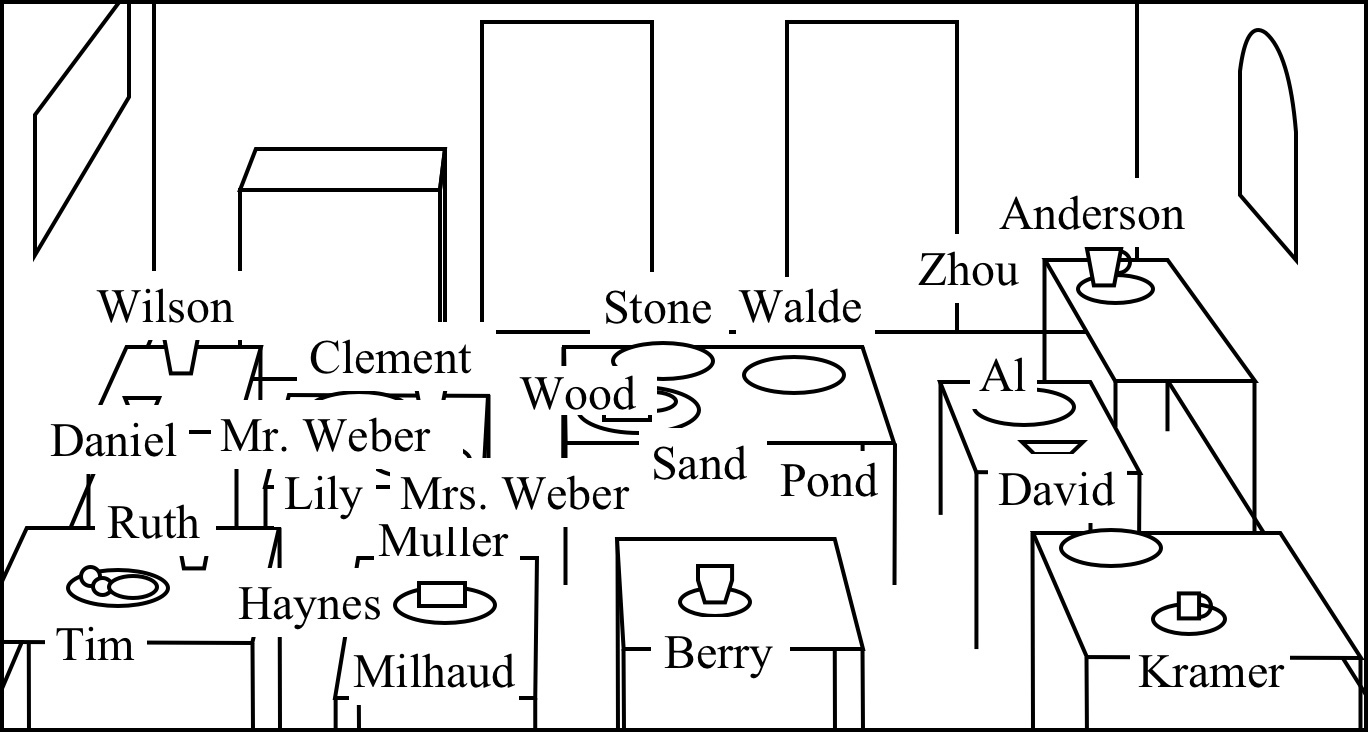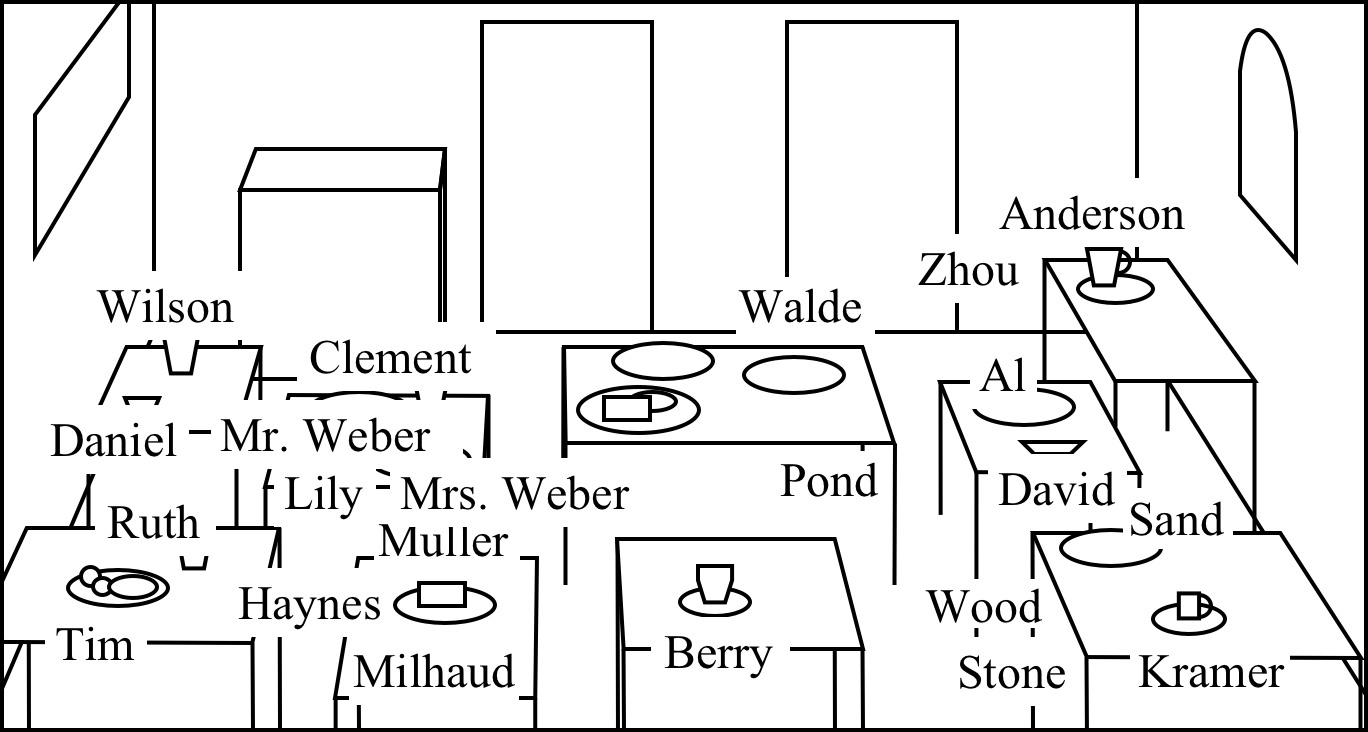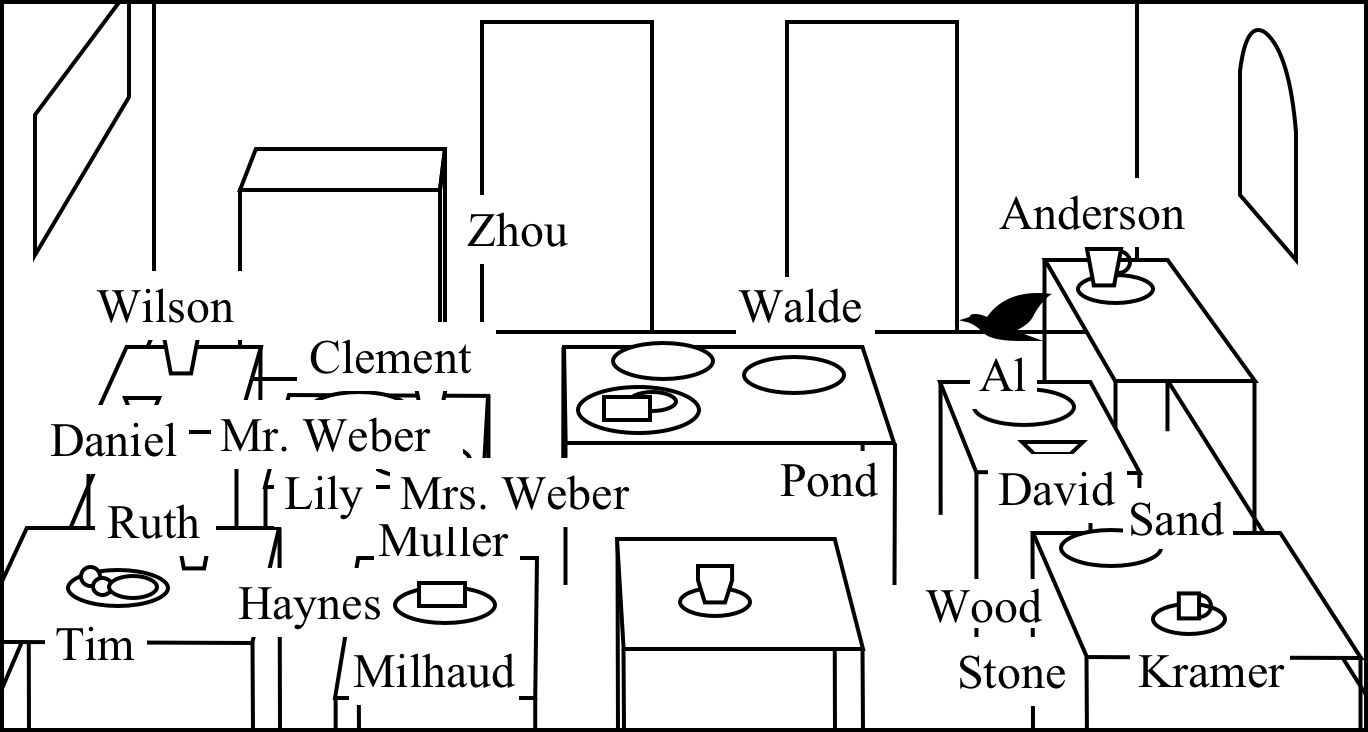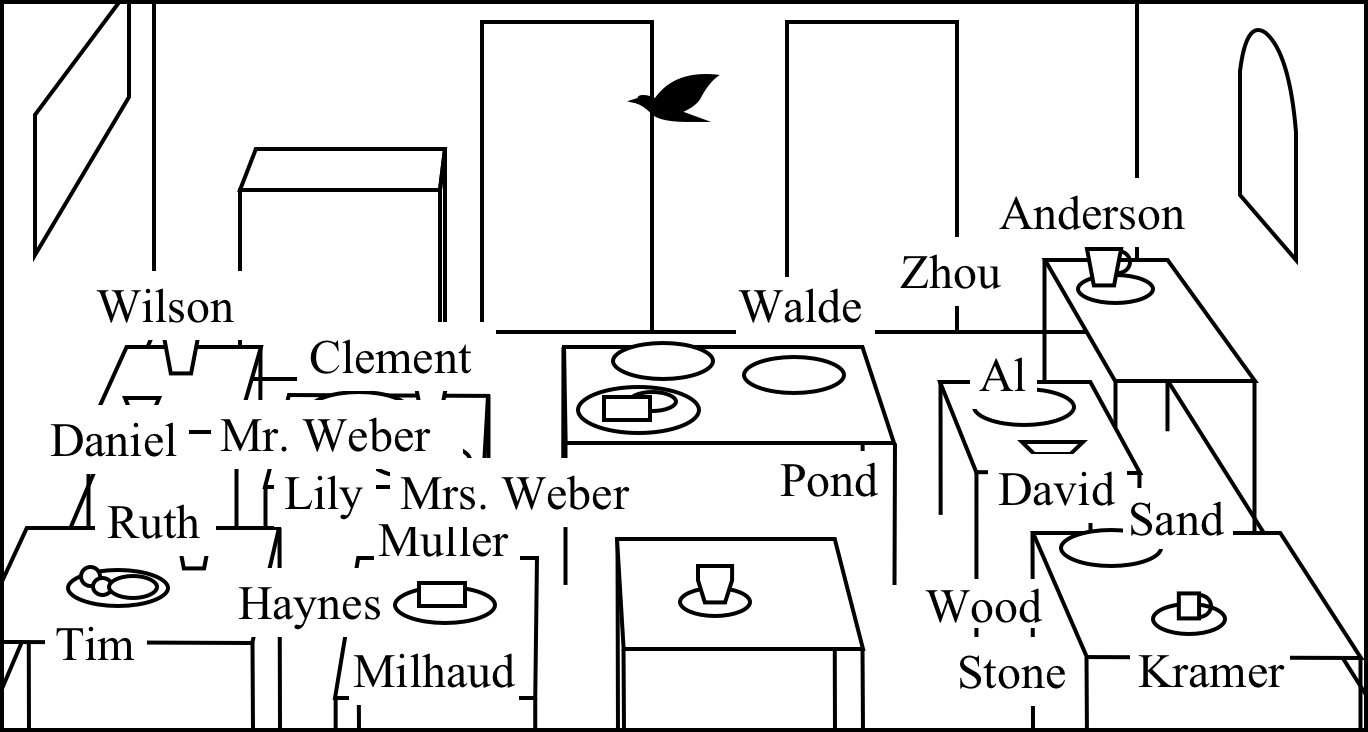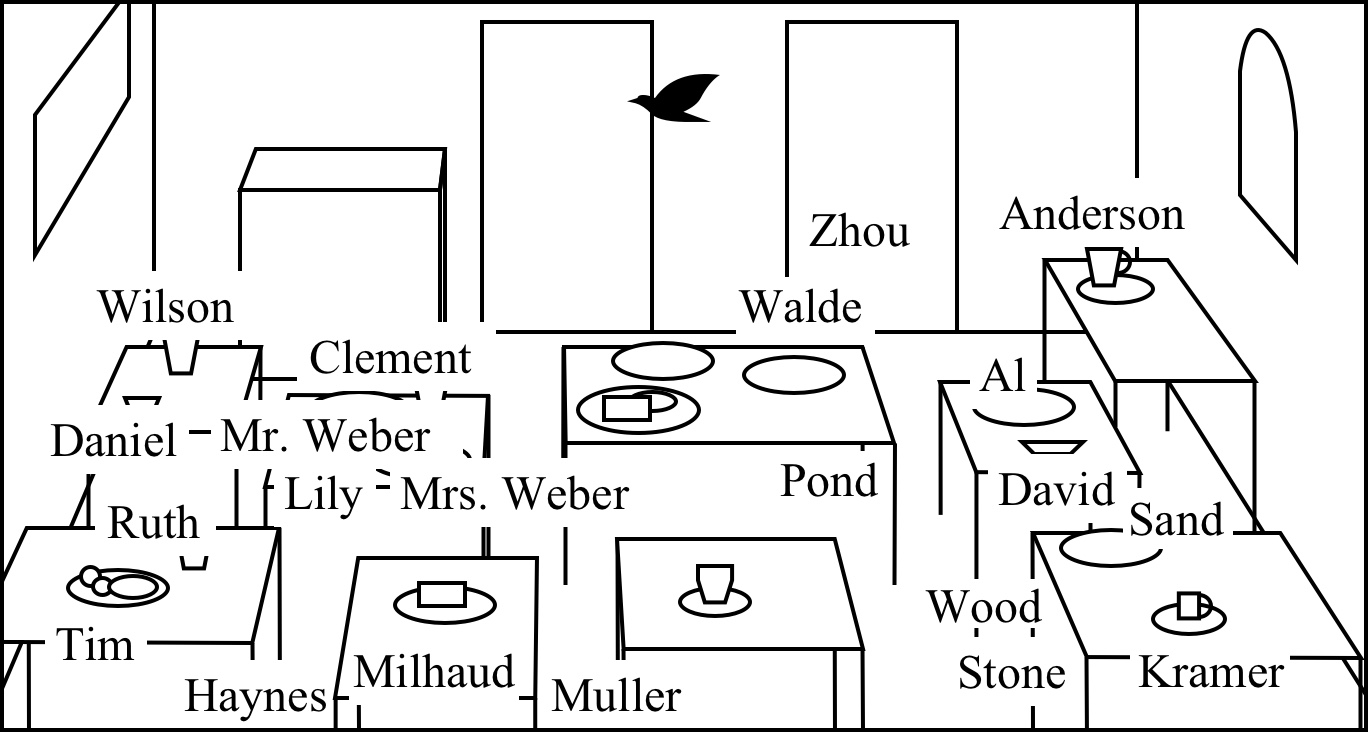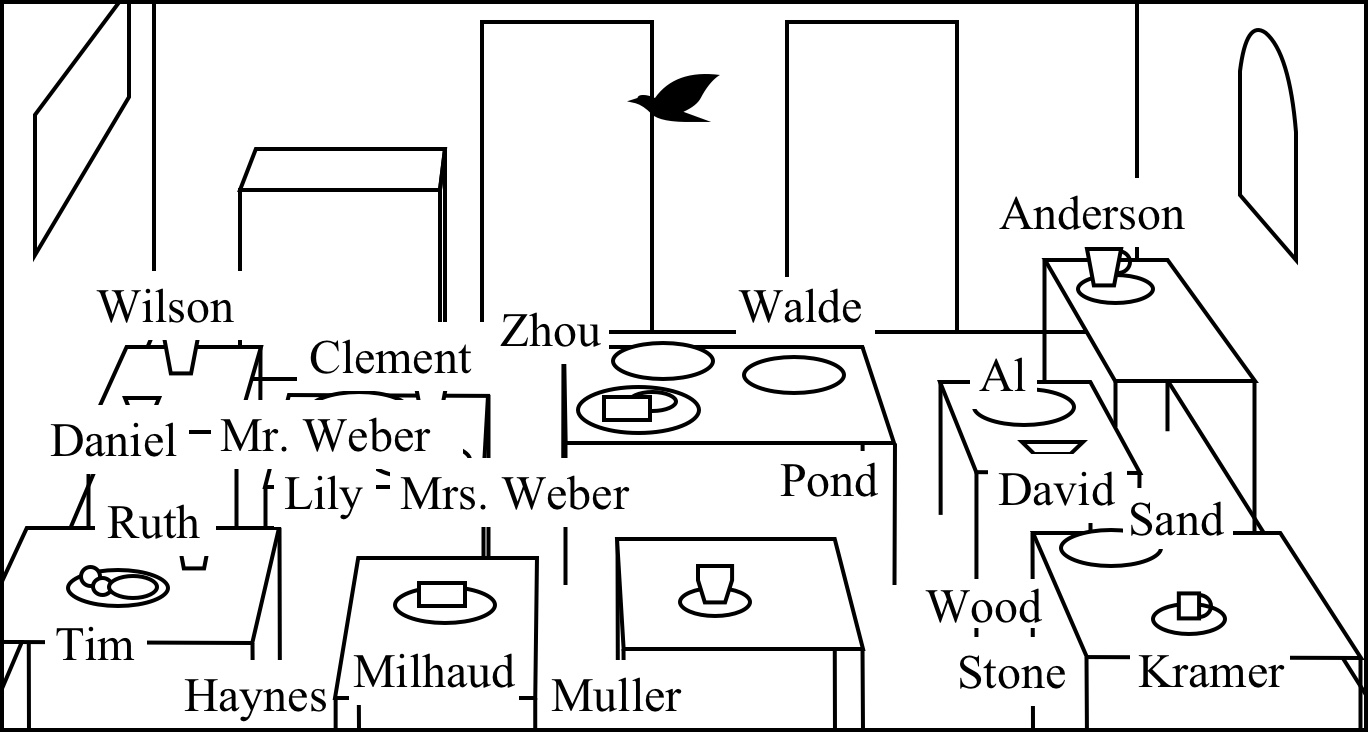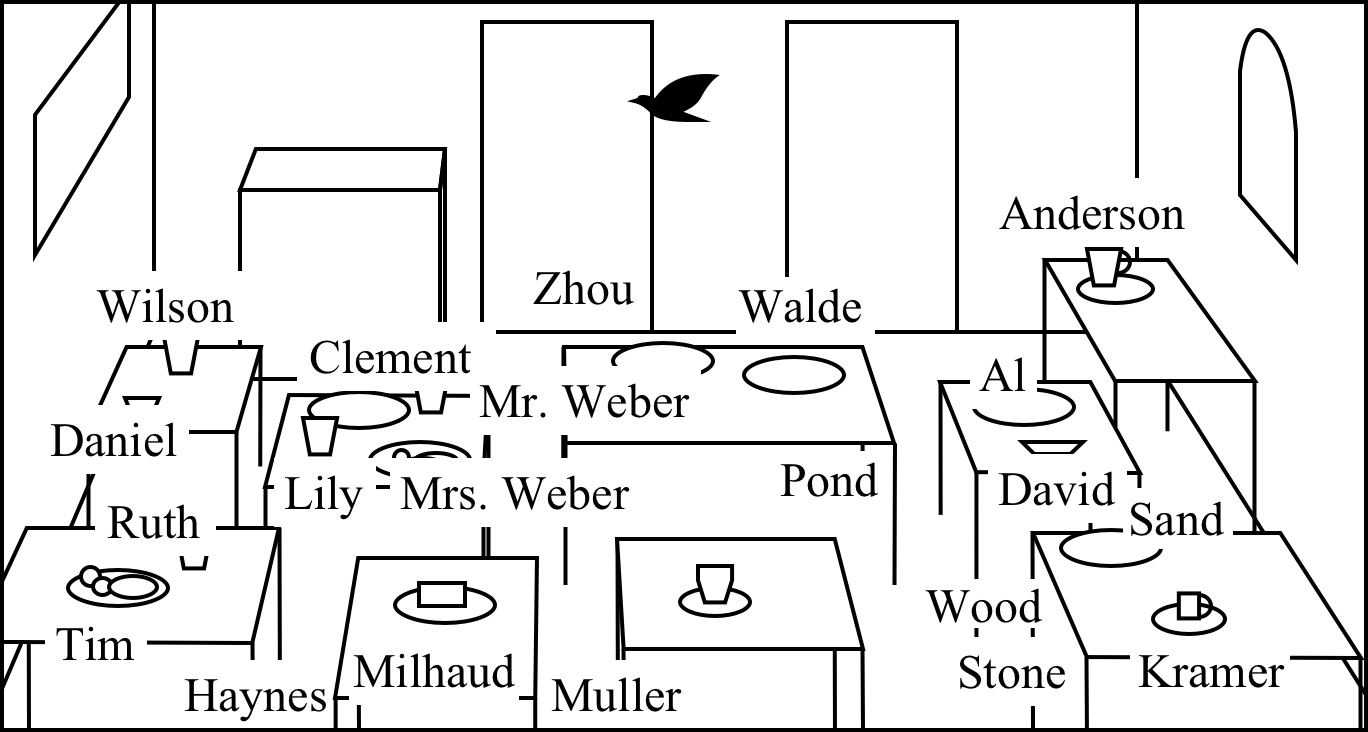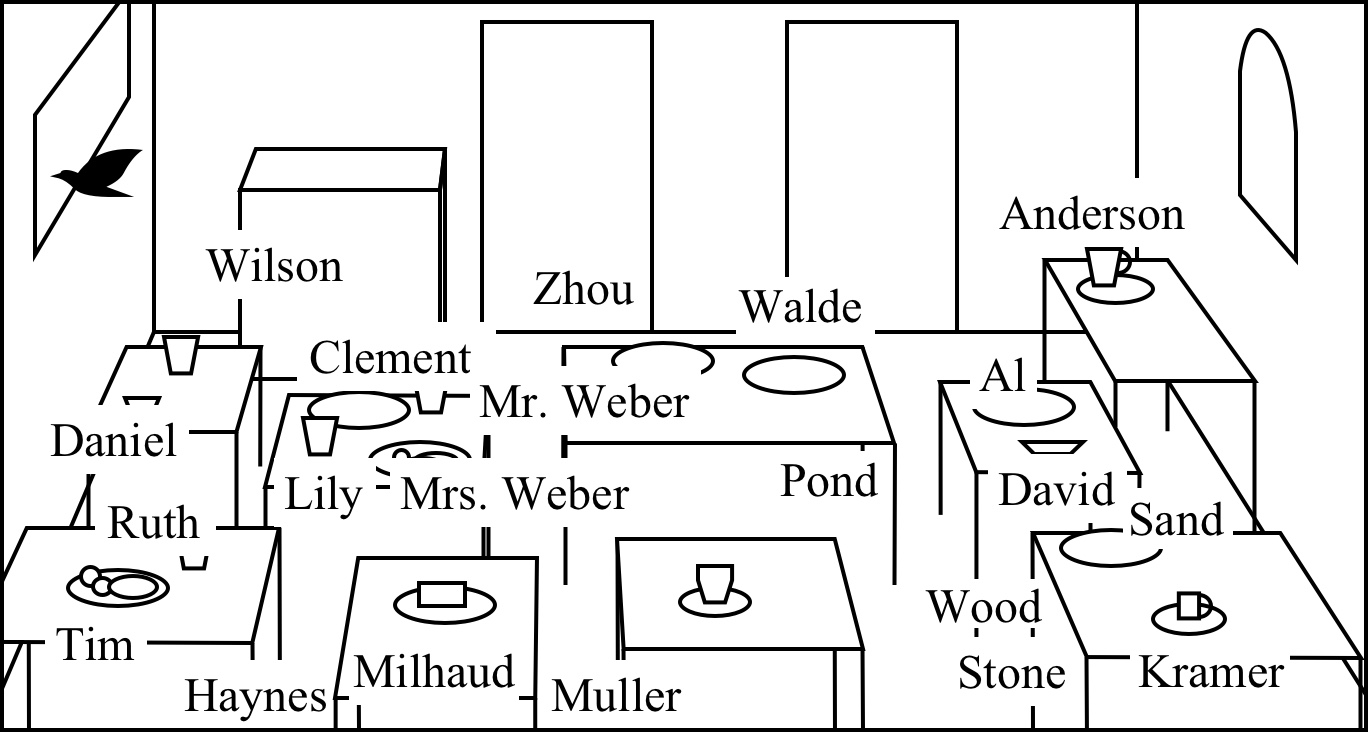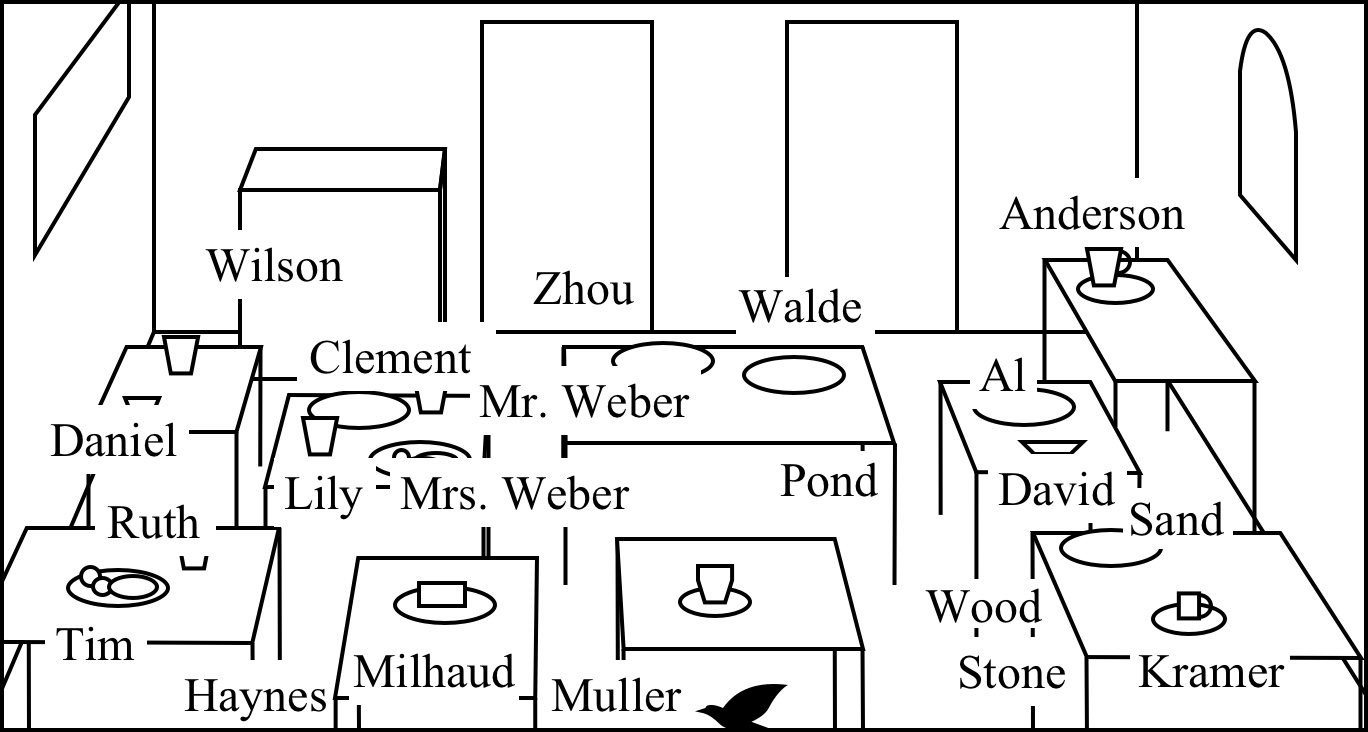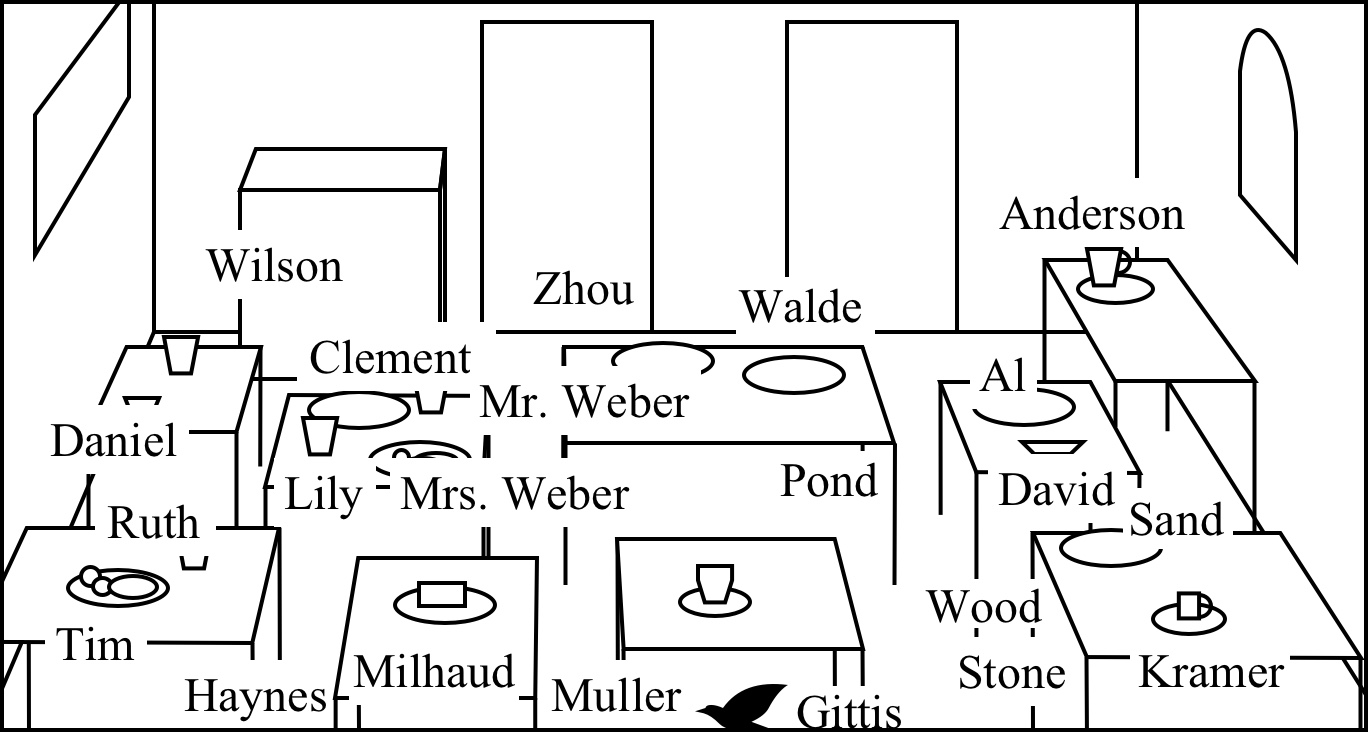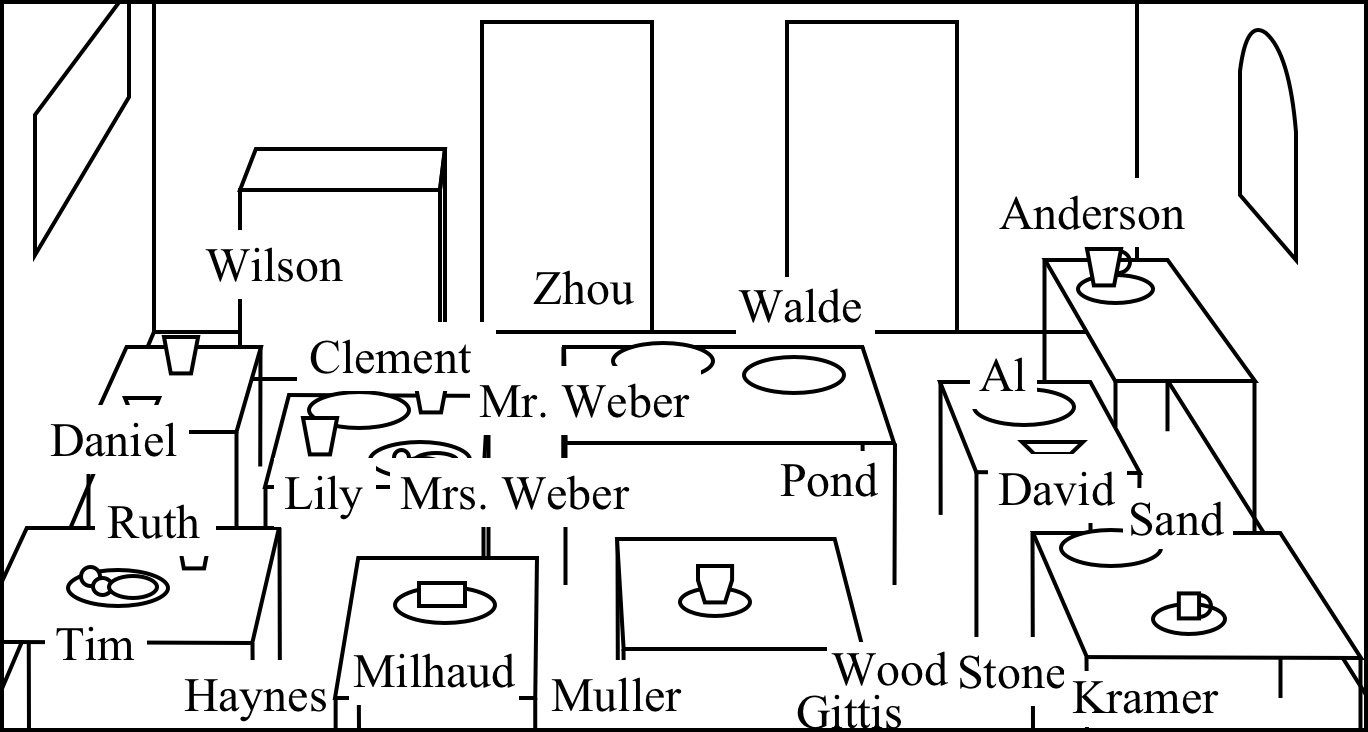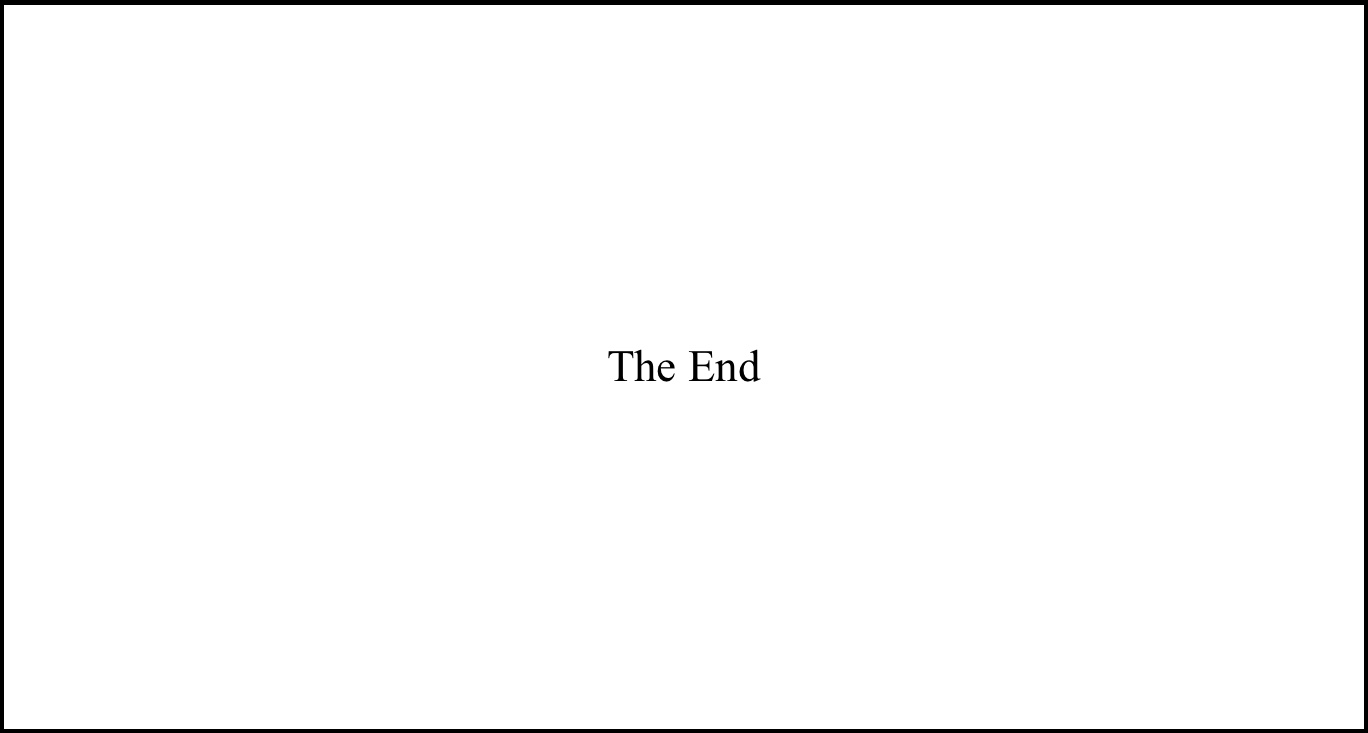Anderson, slightly balding, wore a dark gray pullover sweater that shone a little smaller for his size, but with long sleeves that formed many folds on his arms. Right now, he was sitting alone in the right-hand corner of the restaurant against the wall, directly below a low quality print of Fra Angelico’s Annunciation. He kept turning the empty cup on the plastic tray and gazing at the coffee grounds at the bottom of it, without taking his eyes off it for one moment, and for a brief instant he saw the grounds as a couple of ants, causing him to start worrying about his eyesight again. Apparently, he was getting depressed. Recently, he had begun to feel a not-so-strong existential crisis - or mid-life crisis would be more appropriate, he had heard the term mentioned once. He realized that those around him, including those he considered most important and closest - his wife, his children, his mother - had never really made any effort to understand him. The understanding described here is not some deep, soulful communication, but simply the minimum labor required for communication, or a little empathy out of kindness. Once, for example, he witnessed a crow take a small silver cup from a window, but his wife and son just kept laughing at him, “Silver cup! My silver cup!” His wife pinched her waist and deliberately thickened her voice, mimicking him in a clumsy voice, “Where’s the silver cup?” Indeed that he was a little drunk, facing the kitchen window, staring against the dining table, and must have taken the shadows of the trees for crows. But the attitude still annoyed and saddened him, for it had become their normal way of dealing with his words and actions.
“Waitress!” He put down the glass he’d been turning over in his hand and pushed it forward a little. “Another Americano for me, please.” Feeling regretful right after ordering it, he went on to ask, “By the way, do you have any trouble with ants in here?”'No, sir.” He nodded. “Any thing else sir?” “Nope.”
More than just attitude, he continued his vexation: for a long time he had felt quite content, with his career, with his family, with himself. The word “mediocrity” had never surfaced in his thoughts, but now he was terrified to find that he could not escape the interrogation of that word for a moment, from the way everything and everyone around him related to and reacted to him, from his exchange of glances with them, or from the mirror. Looking at the black outline of his face reflected in the smooth surface of the tray, he recalled himself in the mirror. He had aged more rapidly, he had not been so worried before, he had always thought that men should become more masculine, more attractive as they aged - but such aging had not brought him the expected changes. He then thought back to his youth, not remarkable in all respects, but he would have been considered a rather good-looking man, and although he could not recall any particulars, he had always thought he had a fine eyesight and good taste. He picked up the coffee he had just brought and took a small sip. Where had such eyesight and taste been exercised? He tried to remember.
Anderson had just started to notice that there was something oddly shaped about the table from his point of view, and although he hadn’t studied art seriously, he knew some of the common sense of the shortening method, but the width of this table appeared longer in the distance. Such a strange, inferior table, he thought, feeling a little absurd. A man in a comic costume and a strange fur hat sat at the far center table, making exaggerated gestures and talking loudly, but no one was really listening to him. People who behaved in such an eccentric manner as to disturb others should be properly guarded and kept out of trouble, Anderson thought. Near the window, a young couple were talking, the boy seemed rather impatient, the girl kept watching him, eager and looking slightly indignant. They reminded Anderson of his son, who had rarely spoken to Anderson about any of his life, and likewise asked very little about Anderson himself. In fact, he showed a direct display of total indifference, which rather resembled his own youth. Next to them against the wall, opposite to Anderson, sat a middle-aged man who looked to be about Anderson’s age along with a young man, the middle-aged man speaking pedagogically about something, he gesticulated with one hand, while the other rubbed his thigh vigorously. The man’s appearance disgusted Anderson.
He continued to look around the restaurant, there is a man with a flippant demeanor, he had just risen from his seat, and it was only after the man had passed as he walked by, following the path, Anderson noticed a painting on the wall behind him, it was a wide canvas divided into three groups of figures, left, center and right, a man on the left crouched, flipping something out of the water; a large group of people clustered together in the center, and two more in front of the building on the right who seemed to be holding hands and passing Something. He was more interested in history than art, and“more interested in history" was how he felt about art, which was just as distant, but more valuable, he thought. He looked at the painting and stared at it, not in the mood to interpret or appreciate it. He was still troubled by his lack of attention to the affairs of life. At this point, however, a slight tickle on his arm interrupted his thoughts, and he looked down at the right hand that held the handle of the cup and found it empty, with an ant crawling on the back of his hand.
“Waitress! Waitress!” Anderson quickly clasped the ant that was fiddling with its antennae on the back of his right hand with his left hand and was keeping an eye on it in case it slipped away, while shouting for the waiter to come over. “Sir?” At the sound of her voice, Anderson looked up at her for a moment, and then he turned his attention back to his hand, and he slowly brought his left hand up, “It’s an ant!” The ant was still in his hand. “The ant came out of a coffee cup!” As he spoke, Anderson realized he couldn’t prove it and was a little annoyed that he knew it was true. “My apologies, sir, and I’m sorry that the ants here are spoiling your appetite. This coffee... would you see if this would be to let me get you a new one now. My apologies.” She was apologizing, but Anderson heard a hint of contempt for him, and he Didn’t say anything, nodding his head with an unhappy expression.
Waiting for that new cup of coffee, Anderson suddenly heard a short, quick rattle on his tabletop, like the sound of someone tapping their fingers on the tabletop. Anderson scanned the tabletop in confusion, but there was nothing. He then bent down to look under the table, on a stand at the bottom of which was built a nest the size of a bonnet. A crow poked its head out of the nest and kept pecking at a swarm of ants approaching the nest on the underside of the table. Startled by what he saw, Anderson sat bolt upright and leaned back against the back of his chair, making it creak with a sharp, screeching sound. Anderson hesitated for a moment and shouted, “Waitress, get over here!” And then he quickly bent down to look, just as the nest snapped to the floor and the raven immediately flew out from under the table. Anderson, however, had no time for the crow, he picked up a shiny gadget from the crow’s nest that had fallen and scattered on the floor - it was a small silver cup.
“It’s him.” Inspector Kramer drew a thin cigarette from a fine flat brass cigarette case and tucked it back into his breast pocket.
After four hundred and thirty-five days of elaborate and meticulous information gathering, snooping around, and repeated planning and speculation, Inspector Kramer finally met the suspect he had been looking for a long time here in this diner. At first just another ordinary private detective case, but out of a sense of justice and a desire for adventure that took Detective Klemme by surprise, he uncovers a hidden crisis that has been in the planning stages for some time.
Inspector Kramer did not light his cigarette instantly; he ran two stout fingers repeatedly over the cigarette’s slender paper coat, which was slightly creased by dampness, and leaned back comfortably against the back of his chair to watch the three men in brown formal dress at a distance. They were unaware of Kramer.
“The one in the middle is Stone.” Inspector Kramer whispered to his assistant, Grey, and at the same time finally scratched a match and lit his cigarette. Grey made a gesture of looking around the dining room and eyed them. Grey confirmed the target and breathed a brief, strained sigh of relief.
Looking calm and collected, Inspector Kramer, who was now looking away from Stone and the others, looked quite relaxed at the picture frame on the far wall. “Isn’t that the painting of Fra Angelico?” Grey then looked over there as well, which he hadn’t noticed just now. “Probably.” He echoed Inspector Kramer, though he Didn’t really have any familiarity with the painting. “That’s an odd choice for a painting to hang in a place like this.” Inspector Kramer smiled at Grey.
Two men had just walked in, also dressed in old-fashioned brown formal suits, and they scanned the restaurant with a solemn look before sitting down at the empty seat at Stone’s table. The arrival of these two men was unexpected by Kramer.
The sudden appearance of the two men caused Inspector Kramer a slight uneasiness; things were going more complicated than he had expected. “The Grey-haired one looks like a boss.” Grey, also noticed the two new arrivals, folded a napkin in his lap and held it in his hand. Kramer was silent. “Looks like Gittis Didn’t exactly pry into their group.” as Grey continued speeking, Kramer made a soft“hush” sound. He was trying to hear what they were saying. The two student sitting between Kramer and Stone were talking loudly, and the strange man at the next table was speaking mysteriously to himself, making the already muffled conversation at Stone’s table rather indistinct. Kramer then noticed that Stone and the others were looking at pointing something while together, only vaguely making out“Square ..... fireworks...” some scattered words. He realizes that this object may provide important clues to their actions. Inspector Kramer got up and made his way to the restroom on the inside of the diner, he quickly passed Stone’s table and saw that on the table was a scrawled newspaper with a map attached, which he immediately identified, albeit fleetingly, as a preview of the parade for the quadricentennial celebration of the local citizens’ reclaiming of City Hall.
Kramer went into the restroom, kept a silent count of half a minute, and pushed through the door back to his seat. “Go get Officer Gittis,” Kramer said to Grey. After a moment of stunned silence, Grey nodded and made his way to the door.
Stone and the others noticed him as Grey went out, the new guy was watching him, he then spoke to the others and now all five of them were looking at Kramer. Inspector Kramer picked up a small glass with a short straw and drained the aqua green liqueur from it.
“No need for this gossip, Mueller, we both know what we’re here to talk about today, so let’s get right to the point.” Milhaud interrupted Mueller, who was describing the massive car traffic jam he’d encountered this morning, and cut to the chase, as Haynes snickered beside him. “Good.” Mueller put away his attentive smile and slowly made the folds of his face serious and gloomy. “In order to show our sincerity and to make the conversation work smoothly and the purpose successful, I have prepared a very generous offer for you. I also hope that you will recognize the situation and appreciate the opportunity.” Milhaud, apparently unmoved, quickly replied, “Whether the offer is generous or not, we will have to judge for ourselves, so please go ahead.” “One hundred and twenty thousand dollars, in one lump sum.” “Mr. Mueller, please Don’t be joking and allow us to talk seriously, or if this isn’t a joke, then I think you’re insulting us.” Mueller expected that Milhaud was about to bargain and wasn’t surprised by his sarcasm, “Mr. Milhaud, please be realistic, with my knowledge of this industry, a small company like yours that is just starting out will certainly not be able to sustain itself with the cost of your supply chain and such a low selling price. I know you are frustrated and perhaps even in debt, but this is the best you can get.” Milhaud:“Since Mr. Mueller talks about recognizing reality, let me also analyze the reality for you: your company is rapidly losing customers, and you are going to be attending a shareholder meeting when you will have to explain to them why the most profitable branch of the company is in dire straits. This may have an effect on the management of the company, so I think we should not have to worry about competition with your company but simply wait until you, Mr. Henrik Mueller, is out of office.” Mueller, slightly indignant and silent for a moment, replied rather reluctantly, “Well, I’m not quite sure about the feasibility of that, it’s up to the company to approve it, but let’s put it this way for now, a one-time payment of six hundred thousand dollars, what do you think?” Upon hearing this, Milhaud was expressionless and made no response, he leaned over and exchanged glances with Haynes, so then Haynes said, “If you would allow us to go outside and discuss this alone.” Müller looked slightly more relaxed as he immediately replied, “Yes, of course, then please discuss, there’s no need to rush.”
Milhaud and Haynes walked out the door as they whispered, their joy over Mueller’s opening bid was evident, Mueller sat there and watched them leave. Now that Mueller was left alone, he pulled out a small notebook from his trouser pocket, flipped to a page with a bookmark string in the middle, crossed the last line of the number, and wrote down something underneath. Mueller was quite complacent, and he was sure that they were satisfied with this price, not realizing that Mueller could offer higher ceilings. He was obviously quite disdainful of the food and had no intention of tasting it, inviting Milhaud and Haynes to this restaurant was completely due to the convenience of the location and the low price. Thinking of this, Muller felt even more contempt for them. Because of Milhaud’s rather antiquated and small-minded way of doing business, and also because of a verbal dispute between him and Mueller himself, Mueller decided last year to remove Milhaud as branch manager, and he resigned outright, and Milhaud’s long-time advocate, personal secretary Haynes, followed him out of the company. But Mueller Didn’t expect that Milhaud would then start his own small local company, selling the same product at a surprisingly low price and taking away a number of his former suppliers, putting Mueller in a quandary. To him, this was nothing short of blackmail. After all, the matter was probably settled by now, Mueller thought, so he Didn’t want to dwell on it and looked around leisurely. There was a man walking to the restroom, glancing deliberately at the passing tables; at one table that looked to be a family, husband and wife with their children, looking unhappy, as if they were arguing. At that moment, Mueller saw Milhaud return, and he put on a polite smile, ready to end this negotiation. “So, Mr. Milhaud, have we finally reached an agreement?” “No.... No. We do not accept the offer you just made.”
Mueller got angry, he Didn’t wait for Milhaud and Haynes to sit down, he rested his elbows on the table, leaned forward with his upper body, put his face close to Milhaud and said, “I advise you to be men of understanding, you have touched my bottom line, if you are still not satisfied, then let’s not negotiate any more agreements, fight to the end and see if you two worms or me Mueller can last longer.” Milhaud and Haynes smiled awkwardly, Milhaud:“Mr. Mueller, please Don’t get angry, or my next proposal will be hard to make.” Mueller’s anger Didn’t subside, but he sat back and pulled out his handkerchief to slap the sleeve of his jacket that he had just leaned over the table.
Milhaud waited for Mueller to finish tidying up his sleeves, then spoke up, “Mr. Mueller, your offer has been quite generous, and we have understood your feelings, but on balance, we still feel that there is another, better solution.” Mueller had run out of patience, “Please speak up!” Milhaud straightened up and said, “We would like to be reinstated to our positions in the company.” Mueller scoffed at that, covering his eyes with one hand and rubbing his temples forcefully, “Look, you know the situation, this kind of decision is not something I can make on my own... I’m here today with the intention of getting this matter settled once and for all, but if you Don’t have that intention, then we'll There’s no point in going on. As Mueller spoke, Haynes kept looking behind Mueller, before Mueller could finish his sentence, Haynes suddenly called out, “A crow!”
Daniel:“Good evening, Mr. Wilson.” Wilson is a little late and as he heads to their seats, Daniel stands up to greet him. Wilson:“Ah, good evening. I was very surprised by your playing.” Daniel:“Thank you. I’m glad you enjoyed it.” Wilson takes off his jacket and sits down. Wilson:“You know, over the years I’ve heard many wonderful players play this piece, especially Kinderszenen, and I’ve probably heard over ten different versions by the most recognized players in the world, but I think you’re the best. It really amazes me that you can play such a superb and unique interpretation of such an overplayed piece.” Daniel:“Thank you, I’m flattered. When I first came over here, I was about 13 or 14 years old, and I always had your book with me. I remember always being inspired by your words when I was learning to play and when I was reading at school. Not only your thoughts and insights, but more importantly a certain authenticity that you bring to your telling.” Wilson:“What year?” Daniel:“I think it was 1999.” Daniel:“This authenticity I think was more personal, I had never seen before. So in a way, some of your views and attitudes were very influential to me at the time.” Wilson:“Hah, unfortunately I Don’t know how to play the instrument. can’t play a single key. And yet I’m here with you today to consult on music.” Daniel had already ordered a pot of black tea before Wilson arrived, and it’s now a bit cold, but they Didn’t worry too much about it and started getting ready for a long talk.
Wilson:“I’ve noticed that there are more and more players coming in from the East to perform over here at the highest level, and they always have a distinctive character to them.” Daniel:“Yes, especially more so in this last decade.” Wilson:“One of the more interesting things to me is that when I was in the East, I saw that the audience was mostly young. It’s a very different situation than here.” Dan:“Yes, at recitals here, the audience tends to be mostly middle-aged and older, and if there are young people, it’s often Easterners. Very few locals show up. Sometimes you can see Near Eastern faces. But it’s generally predominantly Eastern.” Wilson:“That’s of your recitals?” Dan:“Not just of me, but the vast majority of the recitals.” Wilson:“Right.” Dan:“Speaking of why, I’m sure it has to do with their educational background. They grew up in that kind of environment from the middle of the last century, and that’s where they got their habits from. And most of them have played an instrument from elementary school. It’s hard to imagine, but one of my teachers said that in the 1960s, people were expected to carry a score to the concert. And certainly you can see that occasionally in the East today.” Wilson:“Hmm.” Dan:“I Don’t think it’s just culture and interest, but there are institutional influences as well. After all, for their time, music was a necessary part of the educational system. Exposure to classical music became a logical thing to do.” Wilson:“That’s right.” Dan:“It’s hard for me to imagine that other than a group of people who are really intellectually curious and seeking, and of course they’ve always existed and have always been a minority, for most people there would be an ongoing interest in classical music without having any access to it. Because after all it is a... vehicle for providing complex aural information. It can be a lot easier for people with a musical foundation to get into, and I think that’s one reason why Eastern is in the situation it’s in right now, because there’s a huge music student community.” Wilson:“And their parents.” Dan:“Yes.” Wilson:“Based on your experience and what you’ve seen, have you had any conversations with your colleagues here on similar topics and are they concerned about that?” Dan:“It’s always been a concern.”
“Newspapers and other media outlets have also reported on this. And they often make these comparisons, such as in an article I just read earlier: musicians are always made famous here, but mostly from the East. And it’s really not an exaggeration to say that in the institutions here, for example, in piano and violin, there are as many as eight-tenths are from the East.” Wilson:“That is indeed a lot.” Dan:“It’s been so long that it’s been thoroughly accepted and numbed out. I once asked one of my local students if he felt that the focus of classical music was skewed toward the East, and he replied that it certainly was. It seems to have become a commonplace thing for them.” Wilson:“The decline here is really something to ponder.” Dan:“Indeed. But I think it’s also great that classical music is developing and being transmitted in the East, they say that classical music is cosmopolitan and transnational, but I Don’t think that makes any sense, it’s just an imagination, and in practice it’s completely different. Today it’s unimaginable that so many people from the East are performing the same local art that originated from here. It carries a historical significance to me.” Wilson:“This also points to another topic I wanted to discuss. The progression of Western music from around the time of the two world wars to the present day as it continues to move eastward has been witnessed concretely by us. Up to this point, something like what you’re describing has happened.” Dan:“That’s right.” Wilson:“I’m fascinated by this process, I always refer to it as a kind of 'jet lag', and the jet lag of the 20th century Easterners, loving art, always doing what the 19th century westerners did, is particularly interesting to me. You also know that I collect some records, including the most prestigious ones... you’re so young, but I feel that you play better than all of them, and I think that’s partly your personal talent and partly a generational thing, where each generation actually starts from a higher starting point than the last one. And of course, the individual talent creates his possibilities.” Dan:“From a technical point of view you can certainly say that, but aesthetically, as you mentioned, you also love listening to old recordings, and I Don’t think there’s any way that we can replicate the authenticity of a kind of... recording from that era, when vinyl records first came out, of course that’s another issue, they Don’t sound like the records we have now, of course that’s another issue, they Don’t sound like the records we have now.” Wilson:“The kind of quality you hear...” Dan:“You can’t lose that, and it’s a rather humanistic and warm kind of thing. That quality changed instead after the '50s and '60s with that kind of rationalism, that over-loyalty to the score, a kind of aesthetic ideology. So I’m not quite able to agree in an aesthetic sense that there must be a kind of progression in it. As you mentioned, art is constantly changing, but I am more interested in the question of ‘translation’.”
As Daniel spoke, Wilson kept nodding his head in approval and always maintained the look of being attentively listening, but the gesture was almost excessive and made Daniel wonder a little if he was really listening or just trying to be polite and wait for the right moment to make his feelings known. Nonetheless, he continued to speak to him, “Like the comment that one must know German to play Beethoven well. That’s also a very tenable point, because the grammar and logic of German, including its sort of sing-song nature and so on, it’s really rooted within the essence of German music; the same goes for Debussy, some may say that you have to learn French to understand his music.” Wilson couldn’t interrupt, only making the occasional short, low“hmm” sound. Dan:“And that’s why the critics had a certain conservative attitude toward the Oriental performers who had entered the Western music world earlier. Of course, this attitude was more common in those days, unlike today when non-Western musicians were everywhere. I would therefore wonder about the question of translation, whether a German thing could be translated by an Easterner. Because I used to be quite fond of reading poetry, I felt that so many things were not possible, that the language was destined to be lost in translation. So whether or not music also has this problem, I’m sure there were a lot of people who tended to be conservative in their thinking at the time, and they were justified in offering such an opinion. Whether or not music is really a cross-disciplinary idea, an idea that Doesn’t have to be translated, I think the phenomenon we’re talking about now may be confronted with answering just such an notion.” Wilson:“I think painting has the same problem, a work of art comes out and begins its own destiny, and not only the country, but all cultures in this country, can’t predict who will be listening to it or looking at it after this work has traveled through time. As long as there are people listening to it and looking at it, this work is constantly changing.” Suddenly, someone yelled from across the room and Daniellooked over and saw a man digging his body under the table. It distracted him a bit, but he tried to respond quickly to Wilson, “I couldn’t agree more.” As he spoke, Daniellooked up at the ceiling and Wilson also looked toward his line of sight, a crow fluttering wildly around the chandelier.
“Let me tell you about something hilarious on our class lately,” Ruth said invitingly, trying to find a new topic to talk about. She had just finished watching a screening of an obscure movie with Tim which ended on a cliffhanger, and she tried to discuss with Tim the deeper meaning of the trivial scenes at the end of the movie. Who killed the Spanish singer? Where did they end up driving to? What is the significance of the water birds on the lake as the last shot? Tim, however, looked completely unwilling to talk about it, saying not a word about it after the screening, and remaining completely silent about Ruth’s analysis. On the walk from the theater to the restaurant, the two were in a confusingly tense state, as if the screening had been an argument, and Ruth had almost wanted to say goodbye and go home, and had wanted to give up on her plans for the day. It had only been a few moments, and the film’s own convoluted and fragmented plot had begun to blur in Ruth’s mind, and all she could clearly remember was the dissonant, tenuous soundtrack; the short, stiff dialogue; and some confusing shots at the end. “I Don’t think the film needs -- or should I say Doesn’t have - a clear mystery. I think this atmosphere of unresolved mystery and intrigue is what’s most real and central to it.” After listening to Ruth’s invitation to change the subject, Tim suddenly brought up the movie again. “Well, it’s possible.” Friendly and always catering to others, Ruth responded to him affirmatively, but in reality, Ruth was suspicious of him for making such a statement, an ambiguous comment, a pretty phrase that was universally applicable and lacking in actual meaning. Did Tim really understand the film, and Ruth suddenly felt that Tim’s silence just now might be entirely motivated by the same confusion about the film as Ruth’s, and that he might have nothing to say at all. Ruth felt somewhat discouraged and less inclined to discuss the film. “I do understand the overall suspense and the drama that’s being rehearsed, but I just Don’t quite understand a few of the dialogues in that last part, and it feels a little inconsistent with what I understood earlier.” Ruth responded carefully, alluding to a bit of a rebuttal. “By the way, what happened to your class?” Tim forked off again.
“Oh, it’s nothing, it’s just someone in class having trouble with the class next door and I’d still like to hear what you think of the ending of the movie.” Ruth Didn’t continue Tim’s change of the subject, insisting that he respond to her. “What opinion?” Tim was a little surprised by the sudden forcefulness of Ruth’s words. “This content that you mention as an unanswerable puzzle in its own right, this sheer suspense, how do you think the end of the film should be put into such a view of it?” Ruth added patiently, waiting for Tim’s answer, she Didn’t want to dwell on the trivialities involved in these conversations at first, but the ineffectual conversation that had frustrated her had strengthened her resolve to have a complete discussion. “Ah, the ending I suppose also emphasizes and preserves the suspense, that image of the water birds, a clear metaphor for the unknown and anxiety.” Tim speaks with a posture that as if he holds undeniable truths, absolute confidence and even a kind of authority, although what he says is always ambiguous. “What about the final dialogue between the two girls? They seems to have a clearer conclusion, what’s the explanation for the drive-by shots? And the title of the movie, it’s clearly a statement, how does it relate to this mystery?” Ruth became a little agitated, and while she was asking these follow-up questions, she actually had a vague feeling that they could also find a suitable explanation in Tim’s statement, but it Didn’t matter, she wanted to hear Tim’s own response. “Good question, in which case I think I may have come to the wrong conclusion, and I have no idea what it’s talking about.” Ruth was surprised by Tim’s response, it wasn’t his usual style and she wasn’t sure if he was really being honest or just wanted to get this over with quickly.
Ruth Didn’t know what new topics to find out anymore, and she was getting rather tired of the constant effort of trying to start a conversation, and she was tired of talking to Tim, but constrained by an unknown resistance, she was less inclined to leave immediately, and of course there was no longer the right time to say what she had originally determined to say today.She suddenly felt a strong empathy for the end of that movie, though she knew it was a very superficial substitution, and Ruth felt that she was about to get into that sedan and drive away from the oppressive, foggy city to an unknown destination.
“So what’s the problem with your class and your neighbor?” Obviously trying to end the torturous silence, Tim tried to find a topic to talk about, Ruth knew he had no interest in these matters, but still answered, “Oh that, at first it was just a little argument over where two classes put their stuff in the hallway, but then neither side would budge and it got worse and worse, and now all the other classes and the majors know about it! It’s quite humiliating.” Tim, not knowing what to respond to her, nodded. And then, out of nowhere, a crow flew from the opposite corner inside the diner and hovered over the ceiling of the restaurant.
“Yes, yes, I know.” Clement said rather impatiently. “No, no, no, you Don’t.” Mrs. Weber replied at once. “All I’m saying is, stop reading us the news you just read in those silly tabloids, these untrustworthy news... has already been reprinted dozens of times over.” “It Doesn’t matter at all if it’s been reprinted a hundred times, what really matters is that it tells you how important this thing is! People are putting so much effort into resolving this crisis and yet you doesn’t care at all! What’s more, you haven’t read the messages carefully yourself, have you, so how can you make such an assessment?” “I Don’t even need to read it, it’s all rumors, bias, gossip, and comments taken out of context. Everything you read is all so stupid!” “Don’t talk to your mother like that!” Mr. Weber lowered his voice reproachfully said to his son, by his embarrassed look, must have felt that his image in the restaurant was far more important than their argument. “All right, all right! Of course it’s all my fault, let’s not talk from now on.” Clement always liked to respond with multiple sarcasm-filled affirmations. Now, the entire Weber family was furiously staring at an entire table of oddly ordered and matched dishes, not saying a word, except for Lily, the Webers’ youngest daughter, who was completely oblivious to all of this and was bowing her head to the omelet on her plate. Silence was obviously not an accurate description of the situation, although the Webers were silent, the whole restaurant was quite lively, an old man in a blue robe was chanting loudly in ecstasy, like an actor in a play; there were three middle-aged men in identical brown suits, constantly scanning the entire room, talking in a very low voice, almost buzzing resonance; there were two students, who looked like they had finished eating long ago, kept excitingly chattering. The Weber family were now all listeners to those around them.
“Clement, hand me the mustard.” After a long silence, Mrs. Weber said as if nothing had happened, trying to defuse the awkward situation. Clement wasn’t in mood of determined resistance either so he raised his hand to hand her the slimy yellow bottle.
Clement:“Having said that, I do think there are good reasons why these protesters should be supported. Even if they do overreact, it Doesn’t change the fact that they are fighting for reasonable demands. In this case, they are weak in any respect, and deserve to be sympathized with and protected.” Mrs. Weber, not expecting Clement to revive the subject, replied furiously:“No, not if they used violence like that. Besides, they’re not weak, I heard the police keep backing down when confronted, which in turn makes them more violent.” Mrs. Weber said contritely to Clement as she took her dinner fork to remove the excess mustard sauce from her steak. “No, no, no, you are of that opinion precisely because you only see the words from one side, the reports here are completely biased, and I can tell by your attitude that the attempt to smear them is succeeding!” Clement shot right back, and when Mrs. Weber Didn’t make a sound, he went on, “Besides, what do you expect them to do, they only have action to spur the authorities to respond.” “I really Don’t know which side you’re on, but you’re considering things from the perspective of a thug.” “The thug status, which is also clearly being imposed on them, is really nasty, if you ask me.” A few conversations later, the just eased atmosphere was tense again. Mr. Weber, who had no strong views on the subject, and had always been timid and conservative, did not want to say a word about it:“Don’t discuss politics over dinner! That’s always a no-no in a cultured family.” Mrs. Weber acquiesced to Mr. Weber’s comment, stopped making noise, and took a small napkin to wipe Lily’s mouth. “OK, I wonder who brought up the subject in the first place.” Clement returned with a dismissive remark.
Mrs. Weber continued to flip through the tabloid again, and when she saw a report of the death of some expedition members climbing a barren mountain, she lamented, “Look, we just visited this area the year before. Lilly couldn’t even talk then...” Mr. Weber glanced toward the tabloid’s news photo and Didn’t speak. He was perfectly used to Mrs. Weber’s untimely sentiments. When no one responded, Mrs. Weber went on, “Oh, Grandma was there with us, and I remember her standing up on that little hill smoking, it was a real sweat.” Clement wasn’t listening, he saw three of the people at the next table moved sitting at the one in the corner. Mr. Weber also spoke up this time to pick up the story, “Wow, that was a real thrill, she Didn’t think much of it at first, but panicked instantly when we told her.” Mrs. Weber:“Yes, she was so scared that she just squatted on the floor and Didn’t dare to move. I’m glad it was all right, it’s frightening to think about.” “Have to be careful.” Mr. Weber muttered without looking up, feeling quite proud of himself. Clement looked at him and made a vomiting face to Lily, she saw it and giggled. Right after the men from earlier had left that Clement noticed a man at the table by the wall, he was putting his head under the table. “Look, there’s a crow!” Clement suddenly shouted.
Not yet half a year into running this diner, Mrs. Zhou had already lost her enthusiasm for the chores of the store. She leaned against the kitchen door, hands behind her back against the wall, rocking gently back and forth as if to speed up the passage of time, watching her customers with little interest in their faces or words, the small thrill she had felt at the beginning of running the restaurant and meeting each and every customer with a different look and personality now completely exhausted. All that remained was a feeling of disgust for the occasional rude and foolish customers. However, Mrs. Zhou also knew in certainty that these days were just beginning and would not seem to end. Today, the restaurant was surprisingly busy, with tables almost constantly full from noon onward, enlivening a room that is usually oddly quiet. Mrs. Zhou had not renovated or adjusted the restaurant since the previous owner, who was also a Chinaman, had given the restaurant a rather varied menu, which was clearly not Chinese, but also did not seem to have any kind of local theme, but more like a random combination of random ideas from the restaurant she remembered, and the interior decoration was even more bizarre, with old tables and chairs and a few stiff reproductions of Renaissance paintings on the walls. Mrs. Zhou found it strange, but for cost considerations, but also because of laziness to worry about all this, she left the store untouched.
“Waitress!” A man in a sloppy suit was taking her over. He had been sitting there for half a day and had only ordered two cups of coffee. He also asked if the store was infested by ants, which annoyed Mrs. Zhou a bit, thinking that he was obviously a mean and aggressive kind of guy. At first, Mrs. Zhou was very bothered by the name“waiter". In the first few weeks, she always explained to people that the store was operating miserably and did not need much manpower, and except for the chef, the front of the store was handled by the owner herself. Now that she thinks about it, Mrs. Zhou can’t help but marvel at her own patience in insisting on this explanation for weeks. Before she opened the restaurant, Mrs. Zhou had never experienced the exhaustion of doing this kind of servant work. She had to repeat the same words dozens or hundreds of times each day, and even though each customer only heard them once, it still felt like she was doing something utterly ridiculous. At this point, two men were walking into the restaurant and sat down at a table against the wall, wearing the same color as the three men who were already sitting there, probably colleagues dining together. It looked like the meal was almost over, but Mrs. Zhou wanted to check to if there was anything else they could order, or if she could rush them to pay the bill, so she walked toward them.
“Mrs. Zhou!” A sound from the kitchen stopped Zhou, she turned around and saw that it was Chef Klee. Nominally the chef, but he was also in charge of other chores, along with Mrs. Zhou, and due to a lack of staff, the dishes and cups used during the day at the restaurant had to be washed after the service hour. Klee was wiping the water off his hands on his apron, and Mrs. Zhou could see in his eyes that Klee had something to say, and it was clearly not a pleasing one. Mrs. Zhou reluctantly leaned back against the door as she approached Klee. Klee:“I’m so sorry, Mrs. Zhou, but I have to take the day off. I’ve prepared all the dishes and they'll be ready when they’re warmed up. Only the soup for tomorrow is still simmering, so I have to ask you to turn it off later. “ “Okay, Klee, it’s been hard for you lately.” Mrs. Zhou said so, but was actually quite dissatisfied. “You’ve already taken a few vacations lately, has anything happened?” When Klee heard Zhou’s follow-up question, he squeaked even more:“Oh... I... won’t lie to you, I’ve been having some difficulties at home lately, and last week my father fell down the stairs and sprained his back. Thankfully, the steps weren’t too high, or the injury would have been much worse.” “Oh my, that’s no small thing. Be carefull. Many old people may look healthy, but a small injury can make them become gravely ill.”
Mrs. Zhou regretted her words immediately after she said that, not that she was worried for Klee, but it just occurred to her that he would definitely become worried and emotional and embarrass himself again. “Pray to God that he gets better soon. I’m so burdened now, and prices are skyrocketing, and with this sudden change, I Don’t know how I’m going to make it.” Klee further triggered Mrs. Zhou’s displeasure, both because his casual prayer was offensive to her self-proclaimed devotional beliefs and the implication that he was unhappy with his salary. "Mrs. Zhou....” said Klee hesitantly, “there’s something else I’d like to say.” Mrs. Chew already knew what he was going to mention, she was shocked at the timing of Klee’s mentioning it at such an inopportune time. “We’ll talk about it later, you better go and take care of your father.”
“Waitress! Waitress!” Hearing this annoying greeting, Zhou walked over to the rather rude shout, it was again the nosy man who had just ordered coffee. “Sir?” The man was clasping his left hand on his right elbow in a clownish gesture, and when he saw Zhou coming, he lifted his left hand up. “It’s an ant!” He said loudly, “This ant came out of my coffee!” Mrs. Zhou took a glance at the cup in his hand, it was empty. She was surprised and annoyed, and hastily said:“Excuse me, sir, I’m sorry that the ants here have ruined your appetite. Perhaps I can fix you a new one instead. I’m very sorry.” He Didn’t seem to be very satisfied with Zhou’s response, but when he nodded, Mrs. Zhou headed right for the sideboard, hoping only to get rid of him.
Mrs. Zhou took a small coffee cup out of the sideboard drawer and wiped it with a yellowed white square towel a bit. As far as she could remember, the store really had never had ants in it. Mrs. Zhou felt very restless and worried, wondering how much longer Klee would be able to work in the store, the endless chores of the day had exhausted Zhou. Barely had she poured the coffee into her cup she heard a loud noise from the direction of the man who had just called her, followed by another shout, “Come here, waitress!” Zhou was already getting mad, she grabbed the cup of coffee and hurried over to him, only to find him comically sticking his upper body under the table and stretching his pants so low in the back that he almost showed his buttocks. At that moment, a crow flew out from under the table and made a panicked dash towards the shed roof.
Sand:“couldn’t believe it’s tomorrow.” Sand squeezed out a very stiff smile and said to the two men who were wearing the same strange brown short suit as him. Wood:“Yeah, we’ve been putting up with this for so long, and it’s finally time to make them pay. I’ve been thinking about it night and day since that day, and I can’t resist the desire for revenge.” Sand nodded, but he Didn’t mean it that way, he was worried as the time approached. Sand:“Yeah, me too, hopefully tomorrow we'll have a successful operation.” Stone:“Don’t worry about it. We’ve spent so much time planning and enduring the humiliation just to find the right opportunity. There is no doubt about the success of the mission. Now enjoy this last leisurely moment of ignorance and guilt!” Stone kept his voice very low, but his tone had the harshness of a religious fanatic. Wood:“There’s nothing to enjoy, and I’m ready to say a final goodbye to these faux pleasures!” Stone:“Keep it down! Even if you thought so, now please refrain from drawing attention to yourself. Let’s get out of here as soon as we' re done with Walde and his men.” Wood was blunt and raised his voice involuntarily, making Stone furious. When Stone finished, Wood began to feel a little out of control and covered his mouth in a funny way. Sand:“Damn, there’s so many people in this diner, could Gittis’ people be watching.” Stone:“No, I already know Gittis and his crew like the back of my hand, they’re not going to be here. “Sand’s anxiety Didn’t lessen, but rather grew, hesitated to speak several times, but after a long pause he said, “Is that really the right place to do it? shouldn’t we set it in the Fire Department building or some such, after all, they’re the ones who put out the sacred fire. Wouldn’t that be too dangerous?” Stone:“It’s a shame that you are asking such childish questions at this time. As I said earlier, what we have to do is not a simple response of an eye for an eye, but a much larger fire as payback for our already interrupted sacred fire. Besides, the events of that day have proved to us the absolute nature of this struggle, and the last Zoroastrians can no longer coexist with this filthy world, so do you have to worry about such trivial matters?” He felt very humiliated by Stone’s remarks, he was obviously a hesitant and timid man, but definitely not an unfaithful believer. In the brief silence that followed Stone’s rebuke to Sander, Walde and Pond had entered the restaurant. Stone saw them immediately and raised his small glass of wine slightly in greeting. Walde and Pond marched briskly to Stone’s table, pulled out a little of the two empty chairs already set up at the table, and sat down.
“Walde, you’ve never been on time!” Wood was still sulking. Walde ignored him, after sitting himself down, he placed his right hand in front of his chest and recited a silent prayer, and then said to the crowd in a hushed voice, “The tools are in place, at the glass store in the northwest corner of the square, and our men will meet you there.” Stone:“Okay, Wood and I will come from the east coast with the parade and meet you at three.” Sand:“No, there will be guards patrolling the streets and plazas of the City Hall district all day tomorrow, and you can’t just carry out the tools in such way without being noticed, and if the guards check, the plan won’t work.” Walde Didn’t say anything and gestured to Pond. Pond looked around, then went through his coat pocket and pulled out a newspaper. Walde pointed to a small map with many circles and arrows:“We already know the route and duty hours of the guards around the square, at a quarter past four in the afternoon, the day and night guards will switch over in front of the south gate of City Hall, this is the only chance for action, until six o'clock sharp, the parade will go to the southeast shore of the square to watch the fireworks show on the water. The force will be concentrated there as well.” “I'll handle the few remaining Guardsmen in the bell tower and plaza, but move quickly and carefully, it would buy you less than half an hour.”
Pond continued after Walde’s words. Stone nodded, while keeping a close eye on the map, examining for potential loopholes. Sand blanched, the discussion of the specifics of the operation making him begin to imagine all sorts of unexpected contingencies, he grew fearful. Wood recognized Sand’s thoughts and scoffed at him:“None of us are afraid yet, what are you worried about, even if something goes wrong, you won’t be caught up in the clock tower. Don’t you dare flee on the spot!” “Shut up, you idiot.” Walde Didn’t mind them, he noticed that the man sitting at the diagonal table had just passed by and looked at Pond’s map, and now, he kept looking at them while the man next to him got up and left.
“That man over there, he’s listening.” Walde interrupted their gossip and said abruptly. “Who?” “The guy sitting right across to me, in the corner, the guy he was with just went out.” “What now? Leave?” Sand was anxious. “No, he’s seen our plan.” “Let’s go talk to him.” Stone pulled away from his chair to get up and reached into the left inside pocket of his jacket with his right hand.
The Duke of Berry, dressed in a brownish-red fur round hat and a bright blue robe featuring the same brownish-red fur lining, decorated with gold embroidery.
“Le temps venra!”
He looked impassioned, held up a small wine glass incongruous with his image, as if reciting a verse, chanted in a slow, subdued voice, “Le temps venra!”
Duke of Berry:“Architecture surrounds words, words surround symbols, symbols surround vines, and vines surround architecture!”
He gently lifted a corner of the hem with his left hand and pointed to the fabric of the dress with his right. Duke of Berry:“In the ultramarine of my robe are also the trio of lily, the stars, the golden chariot of the sun, and the zodiacal signs of the ecliptic. “
He looked around as if he were preaching to the congregation. Duke of Berry:“Be sure to pay careful attention to detail! All grids, all dots, all textures, all faces. Even the curling multicolored leaves, the circular stone path, the distant windows, the porches, the arches.”
He became solemn and twirled his beard with two fingers. Duke of Berry:“Wait patiently! At this moment, the ropes were not yet tightened, the sticks were not yet swung down, the onlookers had not yet closed the windows, and the smoke had not yet cleared. The soldiers have not yet knocked on the door.”
He gestures vividly, gazing ahead as if the scene described were right in front.”The androgynous youth, levitating in the shuttle-shaped sky, surrounded by clouds, with the seasons running through. Aries hidden in the curls of the hair, Taurus behind the neck, Gemini on the arms, Cancer and Leo on the forearms, Virgo and Libra on the abdomen, Scorpio in the privates, then Sagittarius, Capricorn and Aquaius, and Pisces at the feet.”
Unfazed by the noisy environment, he lowered his head and made a pensive motion.”All together as usual. The throne box and the golden chalice are shining with beads; the ostrich and the camel are resting; the scrolls are arranged in order, without spotting the dust.
Duke of Berry:“Architecture surrounds words, words surround symbols, symbols surround vines, vines surround architecture! All the clues and answers are contained therein.”
Duke of Berry:“Do not ignore the intricately woven relationships of the pattern, do not attempt to break the order of the text, it is they that hold everything together.”
“Le temps venra! The hour will come!”
Duke of Berry:“In January, we drill our troops and feast our guests with gold and silver; in February, we rest among the snow.”
Duke of Berry:“In March, we return to the fields and sow crops with oxen plowing wagons; in April, we go frolicking in the meadows.”
Duke of Berry:“In May, parade in full regalia to the sound of the trombone; in June, tidy the pasture after morning and evening. Trim the wool in July; out for the hunt in August; collect the berries in September; and tend the soil in October.”
Duke of Berry:“In November, let the hogs loose to accumulate fat in the bushes. In December, ask the hounds to help us prepare for another feast.”
Duke of Berry:“All things move according to the seasons, in perfect order.”
“Le temps venra! The hour will come!” After the last sentence, the Duke of Berry paused for a moment, looked around the restaurant, and placed an oval silver coin on the table. He pressed his hat, then walked out the door.
David:“Did you see their show this Friday night? It’s hilarious.” Al:“What show? You mean the party featuring bright yellow posters as teasers? I thought the poster itself was bad enough...” David:“True.” Al:“That poster turned me off from going to see it.” David:“Good choice. Speaking of that poster, I’ve always thought that the Gate Gods, Lunar New Year paintings... or possibly any traditional Chinese prints have really become lousy material for easy graphics.” Al:“Well, the sad thing is that people still like it.” David:“Ah, I think that’s probably one of the reasons why we hate it!” Al:“Maybe.” The two young men, each with a pork chop curry in front of them, had almost finished eating, were chatting excitedly, leaning on the table with their elbows, as if they were doing an unrecorded interview. Al:“Do you ever have that feeling where you have this great idea that you want to work on, but then suddenly somewhere you see something similar that’s already been done, and suddenly it’s like you’ve lost the originality of the idea. David:“Of course I have. It feels like quite an awkward situation indeed. But when you think about it, it’s probably good to have seen it, because if you hadn’t, you might have been accused of plagiarism if you actually made it.” Al:“Maybe. But look at it this way, maybe the idea itself is not fresh and interesting enough.” David:“Sometimes when I see certain works that have been exposed as plagiarized, I actually have a mixed feeling that there is a chance that the idea itself might be similar, which makes me worry that my own creation might one day collide with something.” Al:“I know what you mean, but I actually brought this up because a recent idea ran into such a problem.” David:“Really? You can tell us about it.” Some time ago I was watching a recording of Verdi’s La Forza del Destino on the Internet, and I was struck by a scene that took place in a country restaurant, in which there were quite a lot of customers of all kinds in the restaurant, chanting in unison with the protagonist. At the beginning of the scene, they are dancing, talking, drinking, but then suddenly they begin to sing in chorus as the protagonist appears. They are drawn into a narrative that is outside of them, and as they are drawn in, everything that the various images suggest about their origins is erased, and they suddenly become a function.” Day:“Are you saying that you feel sympathy for them?”
Al:“I think it’s more just curiosity than sympathy. Sympathy for these abstract background characters, who exist to serve a narrative purpose, is certainly a playful, allegorical concept. But in the idea I’m talking about, I’m just excited by the personalities of the characters and the abrupt suspension of the hidden plot. I imagined a work that could describe this phenomenon. But when I happened to revisit Gus Van Sant’s film Elephant, I suddenly realized sadly that a similar concern had already been brilliantly transformed into a work of art - or at least a work that could be viewed from such a perspective.”
David:“I see. But Don’t many plays unfold in such way? The characters have their own agendas, but as a dominant event occurs, their actions are influenced, their paths cross, their purposes change, and ultimately, a multitude of fragmented threads converge.” Al:“In an ordinary piece of theater, the details of the characters are still only a completely functional accumulation, a thin veneer attached to their auxiliary narrative mechanics, and in most of cases, if we are talking about background characters other than the protagonists, a conventional piece of theater is even more usual. It would diminish their characteristics and differences, leaving them as thoroughly legitimate, imagined backgrounds and foils. Even if the main characters are treated in a way that tends to diminish their attributes as irrelevant to the central event, I think it is worth noting the sequence and causality of character formation. So my attitude is less of sympathy for the deprivation of these characters of their individualistic appearance but more of pity for the depletion of these adjectives.” David:“So in this way, The film Elephant really struck me as similar to what you’re saying, in that it tries to keep the characters as real as possible, from the beginning to the way it’s narrated... although in the end the course of their actions mostly ends in an uncontrollable situation.” Al:“Yeah, but I’m not sure about the author’s attitude towards his characters yet, I think in a subject like this he probably still has compassion for them. I think that’s part of what the movie was trying to say.” David:“Agreed.” Al:“Another aspect of the film that concerns me is the narrative structure, or the presentation of the time process. Using overlapping content and scenes to represent multiple events in parallel time is a great way to present this abstract subject.” David:“But it’s also a limit in such medium, which is a single-linear process. The film’s viewpoint can only focus on one point at a time.” Al:“That’s true. That’s one of the starting points of the work I envisioned, to have multiple, parallel narratives all happening at the same time, rather than being filtered by a single author. Thus showing the process by which relatively isolated events can gradually have an impact, eventually overlapping and converging.” David:“Well, it is a new approach, but I think it must detract the viewer’s actual attention from the story.”
Al:“You’re right, but I think if done in the right way, it should be able to make such a point to the viewer.” David:“You mean, making the content itself less readable.” Al:“Right. I think it’s also about the fact that people’s attention to plot is inherently mono-linear.” David:“Well, I was just thinking about that actually, and maybe that’s why this parallel, non-elaborative narrative Doesn’t exist. It Doesn’t exist because it’s not feasible.” Al:“So such stories only make sense the first time they’re told.” David:“Yes. And since the first time telling is so important, it’s important to look carefully to see if there are works of the same type that already exist.” Al:“Well, maybe it does, and we Don’t know it yet.” At this point, Al felt a bit unhappy, or disappointed. Not because of any specific comment, but because their conversation made him realize that the idea might not be as unique and ingenious as he thought it was when he first thought of it in a flash of wisdom. It occurred to Al that he had always been like that, always denying the value of what he was doing at the beginning of the process, or even before it began, and that he rarely finished any work. While thinking about this, David suddenly called out to him softly, “Hey, look behind you. Al turned around and found the man behind him bending awkwardly and sticking his head under the table, not sure what he was looking at. His desk was making a strange rattle. Suddenly he lifted himself up again, and the chair creaked with a noise. He stood still for a second, then shouted, “Come here, waitress!” They looked under his desk and couldn’t see anything, only to hear a popping sound as something fell to the floor - it looked like a bird’s nest, and a large black bird scurried out from under the table in response, startling Al and David to stand up and take a few steps back.
